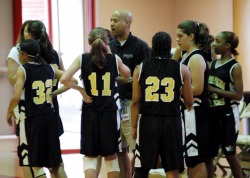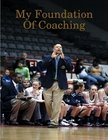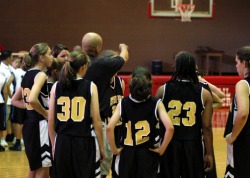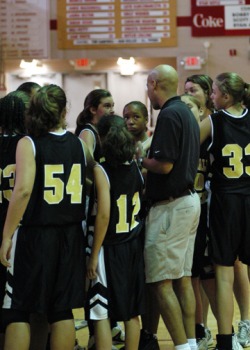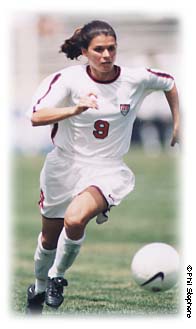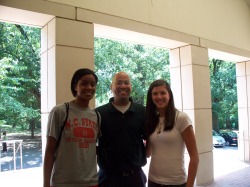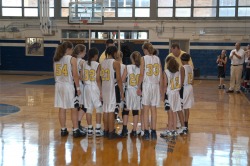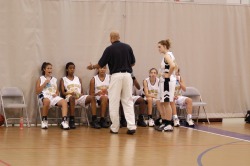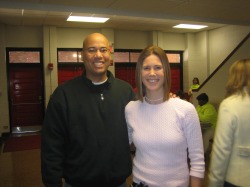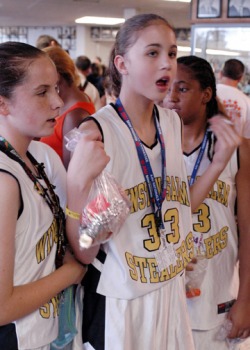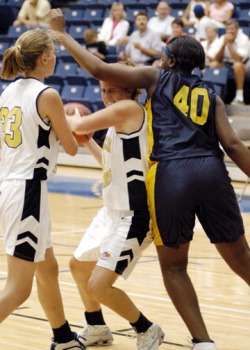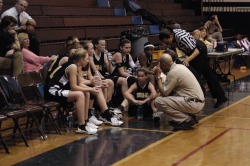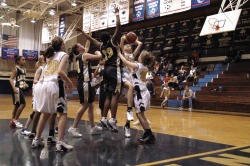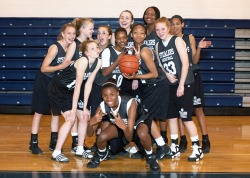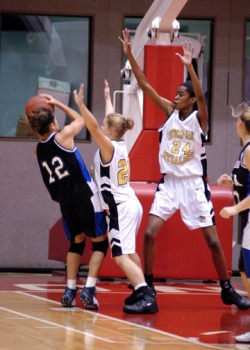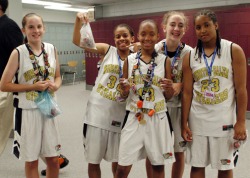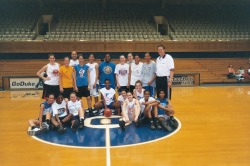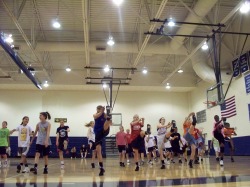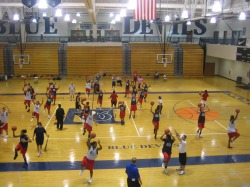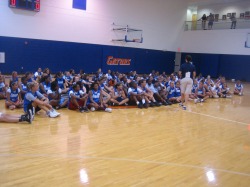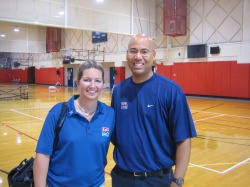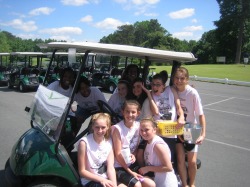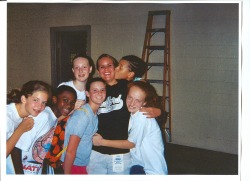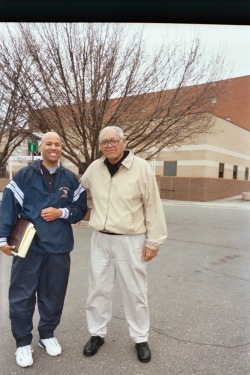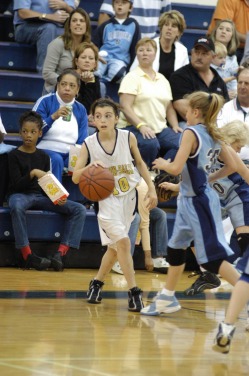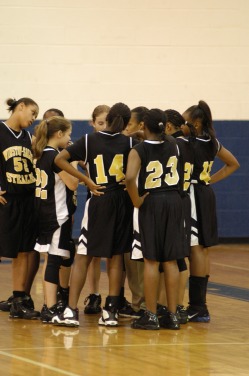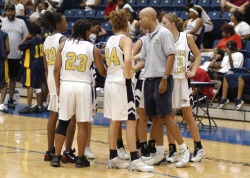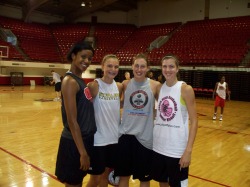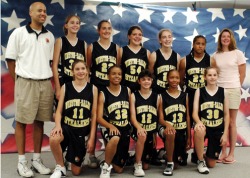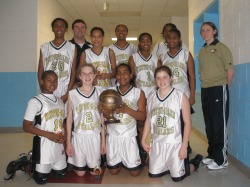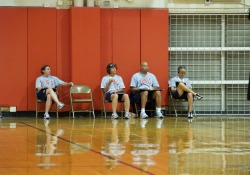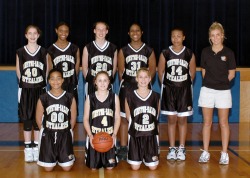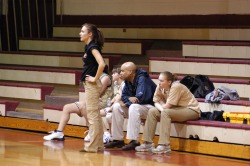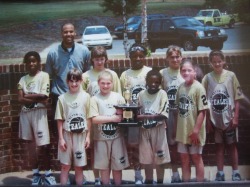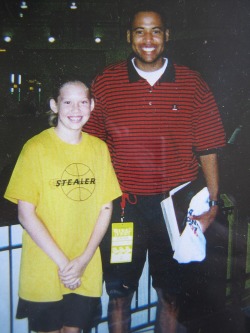These are pages from our old website which we closed in 2015. Many of the thoughts way back when still ring true to this day. These are the philosophies that Coach R built the foundation of the Stealers on beginning in 1996.
GO STEALERS!!!
Post from May 2015:
Our program will have a new web site on May 27th.
The new web site should be up and running sometime in the evening. The discounts for the 3rd-7th grade fall season and August 3 on 3 league for rising 8th-12th graders will remain in place until the web site is launched.
Plans are in the works to allow for team, event, tournament and individual registrations to become easier. Information will be consolidated for our visitors to make it navigation simpler.
Eventually, there will be a way to distribute information quickly to everyone through the site.
GO STEALERS!!!
-
-
THE WINSTON-SALEM STEALERS’ PHILOSOPHY by Coach R:)
-
“Seek out those who can do something better than you can, or those who are just simply better than you are, and learn from them”. = Anonymous
“The only way to do great work is to love the work you do.” – Steve Jobs
-
Our program mission statement: The Winston-Salem Stealers A.A.U. Girls Basketball Program has an annual goal of trying to provide a developmental atmosphere inside of a competitive environment in hopes of teaching young female players positive life skills that they can take with them long after their playing days are over.
-
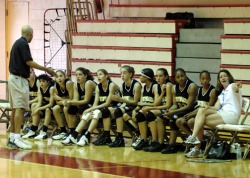
-
Founder’s Philosophy
Coach Robinson’s Program Philosophy and Style
The first rule of coaching: You cannot be everything to everyone and expect to be successful.
“Enjoy the little things, for one day you may look back and realize they were the big things.”
“A leader takes people where they want to go. A great leader takes people where they don’t necessarily want to go, but ought to be.”
We must believe in luck. For how else can we explain the success of those we don’t like? – Jean Cocteau
“It’s better to be alone than in bad company.”
“Criticism is free advice if you use it the proper way.”
My program philosophy is simple. I do what is best for our teams. I run this basketball program because I love the kids and I love the game. I want at all times to be prepared and to place my teams in the best possible position to win ball games. I will not tolerate bad attitudes just to win games. Basketball will stop one day and a good attitude is necessary to function in society, so, I don’t reward bad attitudes at a young age. I believe in giving everyone an equal opportunity in practice to get better and learn the plays that we run. It takes listening, retention and transferring skills taught to earn a playing spot. Those that accomplish those tasks at a consistently high level will get the majority of the playing time. If a player takes issue with her playing time her choice is to strive to improve or find another team. AAU, like play at the high school level, and if done correctly, requires players to “bring something to the table” in order to compete. Those who feel everyone should receive an equal amount of playing time should, perhaps, consider a YMCA or recreational league as an alternative. With me , playing time is a privilege , not a right. Playing time is also not up for debate. AAU requires a high level of basketball talent and skill and the goal is to win. Like a successful business, the better jobs go to those who earn them, who have worked a long time on achieving success, who have talent they have developed, and who, in the end, are the ones responsible for the company’s success. I give kids the opportunity to get better and to be successful not only at basketball but through basketball to also be successful in their lives. When it is all said and done, the relationship built through good times and bad times is what’s left. How a player looks back on their experience by playing for us is important. Everyone that has suited up for us is under my umbrella. I love them all, whether they finished on good terms, as the majority, or on not so good terms, the minority. I run this program for the kids. I do AAU for the kids. Not because I have to, but because I love to. Our program has grown because of endless, endless hours of work put in for 14 years. Some outsiders say that we are good because we recruit. I can honestly say that that is not the case, and that I have personally asked 5 players in 14 years to come play for us; and those were to be part of our National Tournments when their other team was finished for their season. I don’t operate that way because once you get into promising players and parents things to get them to come play for you, you lead them to false pretenses and they tend to take things for granted. It takes a special player and , more importantly, a special person, for me to ask them to come play for us. It also should take a lot more than what one parent says to another parent for someone to choose us if they have been with another team. That is a poor excuse. I think that recruiting is unethical at the prep age, and that youth coaches don’t need to recruit unless they are coaching for their own personal image. What makes us any different than another program ? I am proud of the growth of the program and all of the wonderful support that I get from the majority of the parents. I know that word-of-mouth by them to others has helped the program grow. It is this , plus the hours of hard work that I can say that I will never apologize for trying to run a first – class organization. AAU is a lot of fun. When I was coaching AAU (1996-2004), it used to keep me sharp for high school season and it allowed me to provide many with the opportunity to get better before for their school season starts. I think basketball is wonderful to teach and wonderful to coach. It takes on so many aspects of life : from the adjustments that have to be made on the fly, to having to deal with many different people in a positive manner, to learning how to win graciously and how to lose even more graciously. How to handle success, how to not give up, how to compete for your position and keep it. How to handle criticism from friends, how to handle it from outsiders. How to pick yourself up when things aren’t going so great and how to be mentally tough. Basketball offers so much to so many. That’s why it is a great sport to teach. I love it and I am truly , truly alive when I am around the sport in practice or in a game. Kids Bring Out The Best In All Of Us.
“A sense of humor is part of the art of leadership, of getting along with people, of getting things done”. – Dwight D. Eisenhower
The Fall Season Of 2004 marked the beginning of Coach Robinson turning over his AAU Coaching Duties to others, so that he can now focus on directing the program and making it bigger and better for all involved. Coach Robinson has outside responsibilities of coaching high school basketball as a head coach, and high school softball as an assistant coach, plus running his own business, 292 Basketball. However, Coach Robinson will continue to volunteer his time to keep this AAU Program a First-Class Organization.
-
My Foundation Of Coaching.
In March of 2008, I tried my hand at putting all of my coaching experiences onto paper. I truly believe that everything happens for a reason, and I felt as though the timing was right to try this.
Former Stealer Amanda Cross (now Amanda Brown) interned her junior year of college at Lulu.com, a self-publishing company in the Raleigh-Durham Area, and encouraged me to publish my book through her company.
A pre-copy of this book, which is 299 pages (304 total), is available beginning September of 2008 by emailing Coach Robinson at stlrzcoach1@aol.com or paying below.
A limited number of books will be available for initial sale.
-
-
What Does Having “Class” Mean?
Borrowed from The University of Kansas’ Women’s Basketball Program
and Head Coach Bonnie Henrickson:Class Never Runs Scared.Class Never Makes Excuses.Class Is Considerate of Others.Class Is Doing Your Best Against The Best.Class Never Tries To Build Itself Up by Tearing Others Down. -
Your Role As A Coach.
Our Roles as Coaches in Today’s Society
For many years I have always pondered the issue of what our roles, as coaches, are in society. At the high school, middle school, or AAU/Club level, we don’t make much money coaching even though we have a tremendous amount of responsibility influencing and guiding the youth of America. We are expected to be role models for the young students who we teach and mentor. Many times, we are the only positive adult influence a student may encounter in his every day life. Again, that is why we must hold ourselves to a higher standard and we must remain strong so that we will not fail or disappoint so many who look to us for strength and guidance.
Once this fundamental concept is accepted by us, as teachers and coaches, we can look beyond the every day life in the classroom, in the weight room, on the field, and in the gym. We can expand our horizons and reflect on what our overall role is in today’s society.
What is our impact? What is our influence? In essence, and to answer that age-old human question, what are we here for? What is my purpose? When I am through with my career and I am old and retired, what was my role? What did I do during my career?
We may state many things when it comes to describing our roles as teachers and coaches that may include some of the following facts:
Roles as Teachers and Coaches in Today’s Society
1)To teach and coach today’s young students.
2)To do my best every day when I go to work.
3)To guide and help mold young people as they progress toward adulthood.
4)To be humble, professional, and positive every day.
5)To work to improve my knowledge of the sport I coach.
6)To teach and emphasize hard work and sportsmanship.
7)To be fair at all times with the athletes who play under me.
8)To treat others as I would want to be treated.
9)To continue to work at my profession and better myself.
10)To work with others successfully.These are just some examples that I thought of off the top of my head that might describe what our roles are as teachers and coaches in today’s society. This is something that I have put a lot of thought into as the years have passed. Whether I was coaching, teaching a class, or running my own business, I constantly thought about what I was doing and what kind of an impact I was having on and in today’s society. For years, I have continued to ask myself the following questions:
1)Am I doing the right thing?
2)Am I happy with the job I am currently working?
3)Am I satisfied with my daily life and am I productive in what I am doing?
4)What kind of an impact am I having on the people who I work with?
5)What kind of an influence am I having on the young people who play for me?
6)Am I making the right choices regarding my career?
7)Am I living in the place where I want to spend the rest of my life?
8)Is this where I want to be and do I want more out of life?
9)Am I being strong for the other members of my family?
10)Am I consistently making a good effort or do I let myself slip and become weak?These are just some of the questions that periodically I think about and reflect upon. After all of this pondering, thinking, and reflecting, I have developed my own personal philosophy of what our roles, as teachers and coaches, should be in today’s society. This simple philosophy may seem basic, but when I add up all the things I think about, it all comes back to one simple thought and core belief that I have. The role that I have adapted for myself and the thing that I try and live every day of my life by, is this simple question:
Are we adding value to other people’s lives by what we do?
Again, it’s a simple thought and it’s a basic idea. I can talk about teaching in the classroom, coaching on the field, interacting with students, working with peers, and socializing with friends, and the basic idea I always come back to is asking myself:
1)Am I adding value to the lives of the people I know?
2)Am I adding value to the lives of the students I teach?
3)Am I adding value to the lives of the students I coach?
4)Am I adding value to the lives of my relatives and family?
5)Am I adding value to the lives of the people I work with?
6)Am I adding value to the lives of the friends I socialize with?
To me, this is the fundamental question that every teacher and coach in America needs to sit down and ask. Am I adding value to other people’s lives by what I do? If the honest question is “no”, then you need to re-evaluate what you are doing and why you are in the teaching and coaching profession. Adding value to other people’s lives has become the number one belief that I live my life by every day.
Adding value to other people’s lives can be accomplished by so many methods:
1)How you influence a student who looks up to you.
2)How you talk with a friend who is going through a tough time.
3)How you answer someone when things aren’t going well for you that day.
4)How you react when your team is defeated and how you learn from your mistakes.
5)How you treat your kids when they need to be disciplined.
6)How you talk with your spouse when you are tired and impatient.
7)How you do your work when you are tired and fatigued.
8)How do you treat the people you work with?
9)Am I friendly to the people I meet on the street?
10)Do I say hello with a smile, or do I put my head down and walk on by?
11)Do I let the little things during the day bother me, or am I stronger than this?
12)Do I yell at kids when they probably don’t deserve it?
13)Am I humble in victory?
14)Do I run up the score on opponents?
15)Do I congratulate those who beat me and work harder for next time?
16)Am I petty in my dealings with people?
17)Am I willing to share with others, or am I selfish?
18)Do I listen, or do I just wait for my turn to talk?
19)Do I take a genuine interest in the people I know, or do I just act like it?
20)Am I phony with people or up front and honest?
21)Am I arrogant towards other people?
22)Do I think I am better than other people?
23)Do I talk down to other people when I feel they are weaker?
24)Do I take advantage of people I can intimidate?
25)Do I go out of my way to make controversy and cause problems?These are just some of many questions you can ask yourself when deciding if what you do adds value to other people’s lives. Whether I coach, work in the corporate world, or run my own business, I always ask myself if what I am doing is adding value to other people’s lives.
(Borrowed from “Your Value As A Coach”.)
-
Staying In The Framework Of The Team.
I have observed on too many occasions too many people worry about what awards and honors other people are receiving and thus forgetting that the same opportunity is there for them as well. The difference is that while some sit around an complain and moan, others are working and getting it done. We have had several girls receive some nice individual honors, and all the while, doing it within the framework of the team. The ones that start getting jealous start making excuses about “so and so” getting the glory, and that things are being done just for them to get that glory. What people forget is that not every player has been given the same talent. If you haven’t been given a lot of talent, you have to work double and triple time to make up the difference between you and whoever. Too many times you see players that waste time when they are at the younger age groups, and then start scrambling when they are older because they have fell behind. Those folks look at the ones getting the glory and see a person with no more athletic ability than them, and no more size or speed than them. So what is the difference? The difference is who works and who doesn’t. Don’t let being on a winning team cloud the fact that you have to get better. Don’t let your having to get better, mess up your team’s rhythm on the court. You get better on your own, and while you are working to get better, be dedicated about it. A true work ethic is doing the work when no one is watching. There is a big world of basketball out there. You have to get better every day, or one of these days it is going to hit you that “Oh no, so and so is better than me”. That is when the talk starts about others getting favorable treatment, and the easier path to stardom. There is no easy path to stardom. Yes, you have to have a talent, but it is what you do with that talent that becomes your choice. If you look around you and listen, you hear it. If you are that player that is being criticized, keep working. If you are doing the criticizing, then stop for a second and look around. The person you are criticizing is usually not around because: A) You don’t want to say it to their face. B) That person is probably out working to get better. And, you, are just wasting time talking and criticizing, and thus making yourself more and more miserable and missing another opportunity to get better. Do your work, and do it daily. Don’t talk about being great. Don’t worry about others and what they are getting. Take care of yourself, and if you are behind, you now have to go super-speed to catch up. If you dedicate yourself to making your team better, by making yourself better, then you don’t have to worry about others because you are too busy taking care of what you can control.
-
What Does It Take To Be The Best.
Talking with your coach about your athletic goals is a little bit like meeting with your dad to discuss your career plans–minus the unconditional love. It’s very intense.
Anson Dorrance is a great coach. He’s supportive, encouraging, and motivating. He’s also direct and no-nosense. He knows when you’re faking it. I had a gone through a couple of these meetings with him. I had played for the Tar Heels for a year and for the national team for a few years. I certainly understood the sport, but for some reason, in my sophomore year, I couldn’t identify what I wanted to do next. Against my better judgment, I went into the meeting unprepared. It scared the heck out of me.
“What do you want?” he said. Much to my surprise, I blurted, “To be the best.”
I couldn’t believe I had said it. It seemed totally absurd. “This semester, one of my goals is to be the best.”
“Do you know what the best is?”
I spent a minute thinking about it. “The Best.” It was a fantasy thing, something I had thought about only in the abstract. When put to the test, I realized I didn’t know what it meant.
Finally, he stood up and walked around the desk to the light switch on the wall behind me. He turned the light off. For one second we were in darkness. Then he switched the light back on.
“It’s just a decision,” he said. “But you have to make it every day.” He was telling me I had to choose between mediocrity and excellence every time I woke up, and if I reached for the best, then I head to work that hard to catch up to my dreams.Being the best is a simple decision, like flipping a light switch. It’s not glamorous. It’s not about glory or God-given talent. It’s about commitment, plain and simple. But saying you want to be at the very top of your field and doing it are two different things. Saying it is exhilarating and a little bit scary because you are making a choice to stand out from the crowd; doing it is incredibly hard work. You can’t ever live with “good enough.” Sometimes deciding to be the best feels great. Sometimes it’s discouraging, and almost always it’s exhausting. The bottom line is, if I don’t go into every day consistently committed, I won’t get the results.
By bringing it down to commitment, my coach turned “being the best” from an abstract fantasy into something possible – a larger commitment made up of a series of small efforts. So on days when it’s tough, and my playing is off, I concentrate on one or two things – balance or making a specific goal – instead of trying to get everything right. The other things fall into place. No matter what I’m doing, I make the decision every day.
Mia Hamm
Posted July 3, 2005.
“A true leader has the confidence to stand alone, the courage to make tough decisions, and the compassion to listen to the needs of others. “He does not set out to be a leader, but becomes one by the quality of his actions and the integrity of his intent.” – Anonymous
-
-
The Difference Between A Good Player & A Great Player.
There is a difference in coaching players that are good and great. After sitting down with Head Georgia Lady Bulldogs Basketball Coach Andy Landers, I realize that is definitely true. Here are somethings Coach Landers had to say:
“All good players have the opportunity inside of them to be great. However, they are lacking something such as drive, discipline, attitude, or heart. Those players usually can’t handle criticism well because they already think that they know everything. If you bench them, they mope, pout, or run from program to program. Good players usually have all the physical tools, but lack one of those four traits. These players play hard when they want to, or when they are trying to exact some “revenge” on the basketball court against someone or some team that they used to play for. However, over the course of time, they can’t keep that high level of play because they get unfocussed on what they are playing basketball for. These players spend more time talking and worrying about other players, than they do improving their own game.
I have noticed that great players can take the heat. Great players love to hear criticism because they want to get better. Great players have that inner drive that makes them work when they are tired, makes them fight harder on the court when the stakes are against them. Those players usually stand alone. They don’t have a huge support group around them as far as peers go, because they have different goals that the others. Great players don’t get into a lot of criticism of other players because they spend their time studying the game and improving their play, not talking about others and, in effect, wasting time. (The old saying of “Don’t talk about it, be about it.) That is why they are great, and that is why there are so few great players.
If you closely look at the goings on around in almost every basketball setting look at the players you consider good and those you consider great. It really isn’t that hard to see, but it is hard to see. There are hundreds of thousands of good players out there in the basketball world. But, it is one big thing which is really a bunch of little things (focus, drive…) that makes good ones , great ones.
You never hear great ones make excuses. Either they did it or didn’t. Great ones want the best team to play with so that they can compete for playing time and starting jobs. They don’t want someone (friend, parent, coach) fighting for them to play or start. They want to do it themselves. Great ones quickly get to the front of the line and face the music. Great ones always want the challenge. Good ones need someone to fight for them and, in some cases, hand them things. They need (friends, parents, coaches) to help them get their playing time or their starting job. If they don’t get what they want, they do one of two things (or in some cases both): complain and/or run from the situation. Great players stay hungry through basketball and want to work. Good players would rather starve if it means having to work that extra hour or run that extra mile.
Great ones are hard to find, but every good player has that potential to be great”.
-
Handling Pressure.
Playing in “Big” Games, playing against “great” players, playing in a “tough” atmosphere… those are some statements made when someone says “There is a lot of pressure on this game”.
Pressure, I believe, is something that you bring on yourself.
Usually, “Big” Games come from you putting yourself in position for the game to be “big”. If you have truly worked hard, done your “homework”, and covered all of your bases, pressure won’t be an issue.
I believe that you bring everything on yourself, and that “pressure games” are where the best players thrive, the best coaches coach, and what the best teams live for.
However, it all comes back to if you have prepared. If you go into a game, not knowing what to expect from your team, or from your opponent, you could feel pressure. If you “run your mouth” to try and prove that you are good, instead of letting your game speak for itself, the game is pressure.
Some players, coaches, and teams put the time in over the course of a season, or a course of a lifetime to relieve pressure. Some others happen to be fortunate enough just to be on a good team, and think that is all you need… no work needed. Then they come to that “big” game, and don’t know how to react under some adversity. Then, again, comes the pressure.
Former Pittsburgh Steeler (and carolina panther) Player Brentson Buckner said it best when asked about pressure:
“You put pressure on yourself when you fail to prepare or you haven’t put your all in it,” Buckner said. “Now you’re looking around, you’re trying to find ways to do things. If you prepare well, practice well, know them better than they know themselves, then there’s no pressure. You just go out there and play the game.
“The pressure comes when you haven’t given it your all in a week and now you’re searching for something on Sunday. I’m not going to feel the pressure.”
If you prepare, really prepare, and this goes for any situation in basketball, any other sport, or in life, you won’t feel the “pressure”. It goes for relationships, it goes for grades, it goes for scholarships, it goes for jobs.
“Pressure” is something you bring on yourself. Pressure is in every part of daily life, and seems to find the same folks, and miss the same folks, every time.
Posted on January 1, 2007.
-
USA Today’s “Soul Of A Champion”.
By Erik Brady, USA TODAY
Woody Allen used to tell a joke about school. “I cheated on my metaphysics exam,” he’d say. “I looked into the soul of the boy sitting next to me.”
Soul of a champion is an abstract concept, difficult to define and yet easy to illustrate.
“That’s something I have never felt before — a guy who knows how it feels to be invincible at times,” Federer said.
Only a few people on the planet know what it is to be the best of the best.
During the next 10 weeks, USA TODAY and OLN, the cable network that Monday changes its name to Versus, will go behind the scenes with 11 other active champions — some famous, some not — to explore what drives elite competitors in the Soul of a Champion series.
Andrew Bernstein, a philosophy professor at Marist College, believes he knows why sports stars are so immensely popular in modern culture: Humans have a deep yearning for the heroic — and for momentary glimpses of human perfection.
“We recognize, at least at some gut level, that a great champion isn’t just supremely gifted,” Bernstein says. “The sheer will to excel is what we find so admirable.”
Great athletes all share colossal physical skill. The greatest possess something more — characteristics so transcendent and translucent they elude classification.
‘I’d bottle it up’
What is it that separates great champions from the near-great? There’s no simple answer. Not even the greats themselves can quite put their alchemy into words.
“My goodness, I don’t know,” says Wayne Gretzky, known as “The Great One.”
“If I did, I’d bottle it up and sell it.”
For lack of a more tangible term, we’ll style it as soul.
In Judeo-Christian tradition, souls are immortal. In the secular tradition of sports, Hall of Fame athletes are.
Joe Dumars was inducted into the Basketball Hall of Fame this month. He has championship rings as a player and as a general manager of the Detroit Pistons. “I think soul of a champion means what’s inside of you,” he says. “How much you are willing to do, how much you are willing to sacrifice. … I think that determines and defines the soul of a champion.”
Pat Williams thinks mental toughness tips the balance. The vice president of the NBA’s Orlando Magic is also an author and motivational speaker. “You’ve got to have great talent to be a champion, but … everything triggers off this muscle right here,” Williams says, pointing to his noggin.
The head is important, but so is the heart: Soccer great Mia Hamm says courage is what sets stars such as Woods and Michael Jordan apart. “It takes great skill for Tiger to hit a 2-iron 260 yards over water,” she says. “But it also takes the courage to go for that shot. He doesn’t think about failure. That’s what’s so impressive.”
What they have in common
Patrick Cohn is a sports psychologist and president of Peak Performance Sports, an Orlando-based company that specializes in “creating a championship mind-set” in teams and individual athletes.
Cohn suggests four mental and emotional characteristics common to champion athletes:
•Competitiveness: “This is someone who loves the heat of battle,” Cohn says. “They’re motivated by testing their skills against the next person. Obviously, they love to win and hate to lose. You need that. People might think, ‘Well, isn’t everyone competitive?’ The answer is ‘no.’ The really competitive person digs deeper than the next guy.”
Example: Jordan had a stomach virus before Game 5 of the 1997 NBA Finals at the Utah Jazz, and Chicago Bulls trainers told him he was too sick to play. Jordan, visibly weak, played anyway — and scored 38 points, including the clincher, as the Bulls won 90-88.
•Confidence: “Self-confidence is probably the No. 1 mental skill that championship athletes possess,” Cohn says.
“Simply put, it is their belief in their ability to perform. They see themselves as winners. They think, act and behave in very confident ways, sometimes to the point it can turn people off.”
Examples: Joe Namath told the world his 18-point underdog New York Jets would win Super Bowl III. They did.
Cassius Clay declared, “I am the greatest,” in the early 1960s.
Years later, as Muhammad Ali, he added, “I said that even before I knew I was.”
•Composure: “This one has a couple of connotations,” Cohn says. “The first is: Can you keep it together under pressure at crunchtime? It’s the last minute of the game, and you’re trailing by three: It’s how well you can stay under control emotionally and can perform when you need to.
“The other component is how well you deal with mistakes. Can you stay composed and forget about them? Or do you get upset and frustrated and thrown off your game? Athletes who are composed don’t get rattled and compound one mistake into many.”
Examples: Jesse Owens won five gold medals in the 1936 Olympics in Berlin with Adolf Hitler as witness.
Joe Montana (nickname: Joe Cool) drove the San Francisco 49ers 92 yards for the winning touchdown in the closing moments of Super Bowl XXIII.
•Focus: “The idea is to give focus and attention to what’s most important — and, when you do get distracted, to refocus quickly,” Cohn says. “This is the key component to success in sports such as gymnastics and diving, but it’s important in all sports.”
Example: Franco Harris made the Immaculate Reception in an NFL divisional playoff game in 1972, alertly scooping a deflected pass off his shoe tops and scoring a miracle TD with five seconds to play as the Pittsburgh Steelers beat the Oakland Raiders 13-7.
NFL Films called it the greatest play in history.
Williams interviewed 1,500 people for a book on Jordan and found unanimity that Jordan had an uncanny “ability to block out distractions, zero in on what’s important. It was like he was in a total vacuum — totally zoned in. I think that’s the hallmark, really, of a champion … focus, focus, focus.”
Mind, body and spirit
Plato was a Greek sports geek, an avid wrestling fan known to have attended the ancient Olympics. He also believed the soul was eternal — and that human knowledge was just a remembering of what the soul knew before birth.
“The Greeks worshiped human excellence,” Marist’s Bernstein says. “The great athletes competed naked. The statues we have from the Greeks show human beings as strong and beautiful and healthy. Michelangelo revived that in the Renaissance. This sort of worship of the human body is almost religious.”
Bernstein isn’t. He is an atheist who believes in the sanctity of human achievement. When Bernstein speaks of “soul of a champion” — he once wrote an open letter to Jordan with that title — he doesn’t mean soul in a religious sense.
Patrick Kelly does. He is a Jesuit who will teach a course at Seattle University next semester called “The Soul of Sport: An Interdisciplinary Inquiry.”
Kelly says the notion of the human soul diminished in Western tradition after French philosopher Rene Descartes merged science with philosophy in the 1600s.
“That also changed how people thought about sports,” Kelly says. “The human body began to be viewed as a machine, a tool to produce faster times or to lift more weight. I think that is demeaning to the human person. When athletes start to think of themselves in that way, they get cut off from themselves.
“The steroids issue is related to this way of thinking. From a spiritual point of view, the temptation for the athlete is to think his or her value as a person is tied to winning.”
Taking steroids, from this point of view, is like selling your soul. The Protestant work ethic, by contrast, suggests hard work is soul-nourishing.
And no one works harder than great athletes who have indomitable wills to match their surpassing skills.
“It’s a spiritual thing,” Bernstein says. “It’s in someone’s moral character — some indefatigable quality that a person has that they’re not going to be denied.”
Child’s play
Woody Allen looked into the soul of the boy sitting next to him. Gretzky looks into the soul of the boy he used to be.
“I think the great athletes go back to their childhood,” he says. “They go back to their love of the game.”
Gretzky grew up as a skinny kid with blond bangs and big ears who skated endlessly on the rink his father built in the backyard in Brantford, Ontario — complete with lights strung on a wire from the neighbors’ garage for night games.
Years later, when he played under the bright lights of the NHL, the soul of his game remained anchored in boyhood.
“It never left me,” Gretzky says. “Even when I became a champion, I always had the same feeling I had in the backyard.”
Hamm loved playing soccer as a girl. She also loved winning. “When I was little, people always used to say, ‘It doesn’t matter if you win or lose.’ Well, to me it did.”
Hamm thinks the secret to stardom is as simple as great talent plus hard work.
“Some people think they can train two or three times a week instead of seven or eight. They think they can take a game off. The great ones don’t.
“I don’t put myself in a category with Michael and Tiger. Their skills are unbelievable. But I know how hard they work. They are always finding a way to get better — physically, technically and psychologically.”
Posted on October 3, 2006.
-
To The People Who Have Cared…
Borrowed from “Coach & Athletic Director” March 2006:
Almost everyone who has worked a job long enough must have had his or her life positively influenced by the people around them.
Just think of your family members, coaches, principals, clergy, teachers, close friends, etc. All of who have brought something special into our lives – the things that have personalized us and made us the kind of people we are.
Allow us to list these special characteristics:1) They lead by example.
Not only did they tell us the right way to act, but how to carry ourselves in a winning manner and with a great demeanor – all the positive things.
2) They had a passion for what they did.
They always seemed to be excited and enthusiastic about what they were doing. They were perfectionists with a passion for what worked best in life. I have played for and worked with several coaches who just loved what they did and dedicated themselves to showing us why it is so important.
They were the kind of coaches, who, in spring, would post about three of four pages of clinic dates that would enable us to pick up a lot of good solid coaching information.
3) They were open, honest and straightforward.
They always had the time to talk to you when you needed someone, or to tell you “like it is” even when you had a suspicion you did not want to hear it. If you were not very good at something, they would tell you exactly what you needed to do to improve.
4) They instilled confidence in you.
They had faith in you and made you feel that they believed in you. When you got that feeling from them, you were ready to run through a brick wall and say, “Thanks for the honor, sir.”
5) You knew they cared.
Children don’t care how much you know until they learn how much you care. Once they learn that, they will start doing the hundred little things to show their gratitude to you.
6) They worked hard, were structured, and were organized.
They worked hard at everything they did. There was no half speed. All they knew was full speed. They seemed to have a plan for everything. They maximized every minute, and made short-term and long-term goals.
7) They were not afraid to say, “Hey, I was wrong and I’m sorry”.
This made them seem greater because they showed that they were human and made mistakes, too.
8) They communicated well.
They made you know what was going on at all times and didn’t talk to you like a top sergeant. They understood that everyone made mistakes. Even when their frustration level went sky-high, they still communicated in a respectful manner.
9) They had a positive attitude.
Be being positive, they were able to achieve important things. They always promoted a positive image and put a positive spin on things that needed it.
To all of these people with whom I have experienced such things, I say thank you for positively influencing my life. To all you coaches whose days we may have accidentally lengthened or worn thin, we apologize for hitting under .200 for the day – and promise to keep remembering all the good things in life that we learned from the experience.
Posted on March 19, 2006.
-
Whatever Happened To Playing For The Love Of It?
What Ever Happened To Playing Just For The Love Of Playing?
There is a disturbing trend that I am noticing across the high school, and club (AAU) world these days. That trend is of kids being shielded from competing because they may not win. I have tried to instill in this program that we will not be a program that “settles” for being average, unless being average is the best we can be. I have noticed over the past couple of seasons, parents not letting or wanting their kids to attend big tournaments nationally, because their team might not have the chance to win. What ever happened to the days when it was an honor to go play in the Division I Nationals and compete against the best? What ever happened with “just go out and do your best and be happy with that”? What ever happened to playing just for the love of the game, and for the love of playing”? It is lost, I feel like, in the age of “win or its the end of the world”. That is sad, because it takes away the sheer joy of competition. I loved to find that thing inside of a player that would make him or her rise to another level, no matter who the competition was, how good or how great. The bigger the game, the bigger the challenge, the bigger the reward. Now, it seems like we have folks that want their kids to play at a level they can successful at, and not challenging them to great. It is almost a no-win situation for coaches these days. They get hammered on by parents for not winning all of the time, and for their team not being #1, yet, those same folks turn around and say that they don’t want to compete against the best because they won’t have a good shot of winning. I think that is wrong. You can’t demand the best from a coach or your kid, and then turn around and not play them against the best. You have to beat the best to be the best. Even putting the winning aside and being the best aside, kids need to play for the love of playing and the love of the game.What has happened to playing for the love of the game and love of competing?Posted on June 6, 2005.
-
Cuts.
The hardest part about coaching is cutting players. Cutting players is not an easy thing to do. Anyone who says that it is is very good at separating personal feelings from what needs to be done for the benefit for his/her team. I know that I have cut, in high school and in AAU, several kids who I have developed a strong realtionship with. Some have respected it and moved on, some hold a grudge as if it was a personal decision. Nothing I do with basketball, playing time or cutting, or discplining, is personal. It is for the benefit of the team and , more importantly, the player in the long run. He or she may not see it at the moment, but eventually should. When I cut players, I do it face to face. I do not put up a list, as I think that I owe it to the kids to tell, as a group, who made it and who didn’t. I don’t believe in hiding behind a piece of paper. I tell them all that cutting is the hardest thing to do, but it has to be done. When they are in the room waiting for the list to be read , they are told that if they don’t understand why they were cut, they have every right to come and talk to me immediately afterwards. I will be honest in my talk with them, as they are owed that , and not to be soothed or stroked. They need to know why they didn’t make it – exactly. I tell them that I will still speak to them if I see them out in public, or at games. If they choose not to talk to me, then that’s their choice, and they are telling me that I made the right decision in cutting them. What they are saying w/o saying a word is that I’ll only talk to you when you give me what I want, if not, I am not going to talk to you. Those types are the ones I don’t need on my teams. I call them “sometimes people”. Sometimes I’ll be good, but only when it is good, and sometimes I’ll not be good, because I didn’t get what I wanted. I’ll speak though, or at least acknowledge the people I cut. My feeling is that you make them mad once. They will be initially mad when you cut them, but I’m sure you would take that over them being a benchwarmer on your team the entire season and having to listen to them complain the entire season. Being mad at you the whole season vs. being mad at you once , I know what I am going to choose. Like I said, if they continue to be mad at you long after the cut, then they aren’t the types you want around you anyway. They are telling you that you made the correct decision without saying a word. Plus, trying to keep those you know who aren’t going to play a lot, can cause friction amongst your team which is never good. You have to be a special , special player to be able to be at the end of the bench and accept that role. Coaches love those types of players. They make the team complete. Everyone knows those other types though, the ones that hold grudges because they are the ones who look the other way when they see you coming. They get nervous when you walk into a room,and will bad mouth you behind your back, to try and justify that they are right and you are wrong. I will never admit to being absolutely right, I just do what I think is right for my team, and hope for the best. If I am wrong , I’ll admit it , and if I am right, then the team’s play speaks for itself. I make sure that the entire group that is trying-out thanks each other for making them better. I also make sure that no one pokes fun at those who got cut. If someone who makes the team laughs at someone who didn’t make it, I’ll discipline them quickly, because they are not acting in the way I want my players to act. I try to keep the best 8 players I have at try-outs. Those 8 have to have the pieces needed to have the most successful teams needed, including attitude. They have to be able to be better than others at certain skills: passing, shooting, speed. They need to fit what I want, including their mental state, and basketball IQ. Cutting is something that has to be done. This isn’t football where you can keep 60-70 players. You have to keep your roster under 15 players. To be successful, I beleive that you need to have between 9-12 players. You may not agree with me cutting certain people, but at least you know that it is never , ever personal. People that hold grudges over getting cut, never will go far. Getting cut should drive you to want to get better, and to prove to yourself that you can do it. If you play just to get back at someone or show someone up, you are playing for the wrong reasons. Thought: Before any confrontation, think about yourself in the other person’s shoes. Think about what he/she is thinking to cause you to be upset. Not everyone thinks the same as you. It is called thinking before reacting and thinking before speaking.
Posted on September 30, 2001.
-
Fielding Just An “A” Team.?
As we grow, I have to decide on fielding just an “A” Team, which will require me to cut players from our program, or do we keep a “B” Team as well, which will allow another 8-12 girls to play in with us.
In our first ten seasons, we have had three “B” teams total. Most years, we cut players. The reason for cutting is simply a matter of not having enough coaches, not having enough practice space, and / or not having enough parents that understand what the team is for.
The “coaching” and “space” issues usually can be worked on over a period of time, if folks are patient. The “understanding” issue is, historically, the main problem.
Typically, there are 1-3 players that don’t make the “A” Team for whatever reason, and, in some cases are good enough to be on that team. However, maybe the team has too many players in that one position and that player and their parent won’t be happy with a lot of bench time. Maybe those 1-3 players are not going to fit the team’s chemistry, and thus would be better served on the other team. Whatever the case, those 1-3 players and parents normally do not go to the “B” team with a good attitude.
Thus, the “B” team starts off on a bad note, before anyone gets a chance to see if that team will work.
I have, for the most part, believed that you make someone mad at you once, thus going ahead and cutting them. Let them be mad at you for a couple of days, and be done with it. If you keep them around, and they are mad that they are not on the team they want to be on, they’ll be mad for most of the season. Don’t keep a headache going longer than it needs to be going.
Each year of tryouts is different, and each set of players and parents are different. Thus, each season, my decision to have a “B” team or not is going to be different.
Posted on September 30, 2005.
-
Don’t Forget That Song…
Remember The Song “It’s A Small World Afterall”…
Well, it really is…The bad things you say about others travels a lot faster than the good things…and the world travels in circles…meaning everything you say and do, eventually comes back to you…BE NICE TO OTHERSand
IF YOU HAVE NOTHING GOOD TO SAY ABOUT SOMEONE, SAY NOTHING AT ALL…
‘Cause…
“It’s A Small, Small World.”
-
Famous Phrases To Live By.
1) My kite flies a lot higher going against the wind than with it. – unknown
2) Money is the root of all evil. – unknown
3) The squeaking wheel doesn’t always get the grease to keep quiet, it sometimes gets replaced. – unknown
4) Make your passion, your profit. – unknown
5) Things that can make you “dangerous” in a good way: Direction and some time. – unknown
6) It is the rough road traveled, that leads to heights of greatness. – unknown
7) You can’t be a great coach if you coach scared and if you schedule games scared (meaning you only schedule games you know you are going to win); The greater the challenge, the greater the reward. – unknown
8) The better you get, the bigger the bullseye on you becomes. – unknown
9) Everyone is your friend when you win. – unknown
10) There is something that is much more scarce, something rarer than ability. It is the ability to recognize ability. – Robert Half.
11) The artist doesn’t have the time to dwell on criticism. The artist may listen to criticism but won’t dwell on it. The ones who want to be writers read the reviews, the ones who want to write don’t have time to read reviews. – William Faulkner.
12) The highest of all goals by humans is the realization of one’s true potential. – Aristotle.
13) With all I do, how did I ever find time to work? – Anonymous.
14) If you are going to lead the orchestra, you have to turn your back to the crowd. – uknown
15) Never interrupt your enemy when he is making a mistake. – Napolean Bonaparte.
16) Those who live in glass houses shouldn’t throw stones. – unknown
17) Guts + A Plan = Greatness – unknown
18) Every morning in Africa, a gazelle wakes up. It knows that it must run faster than the fastest lion or it will be killed…Every morning a lion wakes up. It knows it must out run the slowest gazelle or it will starve to death. It doesn’t matter whether you are a lion or a gazelle…When the sun comes up, you’d better be running. – unknown
19) You can’t coach scared, you can’t coach looking over your shoulder, you can’t coach worrying about your critics – you can’t do any of these if you want to be great…DARE TO BE GREAT. unknown
20) Put some pressure on your best player to see truly if you have a great one or a fake one. Pressure makes great ones flourish, pressure makes fake ones crumble. – unknown
21) Never Explain – Yours friends do not need it and your enemies will not believe you anyway.
22) All things are difficult before they are easy. – John Norley
23) It is amazing what you can accomplish if you do not care who gets the credit. – Harry S. Truman
24) It is not necessarily the amount of time you spend at practice that counts; it is what you put into practice. – Eric Lindross
25) When people are jealous, retaliation comes in many forms and can be disguised in many ways. – unknown
26) When you are great, you’ve got no choice but to be great every day. Your critics won’t give you the luxury of a break. – unknown
27) The good thing about tough moments are that you find out who your true friends are. -unknown
28) To the world you may be just one person, but to one person you may be the world. unknown
29) The price of greatness is responsibility. – Winston Churchill
30) We will not know unless we begin. – Howard Zinn
31) Get the facts, or the facts will get you. And when you get them, get them right, or they will get you wrong. – Dr. Thomas Fuller, Gnomologia 1732
32) We must either find a way, or make one. – Hannibal
33) Adversity is really just a problem disguised as an opportunity. – unknown
34) The funny thing about disciplining and injuries is that if your team wins without you, the disciplining takes cares of itself, and the injuries heal quicker. – Bobby Knight
35) The best way to predict the future is to invent it. – Alan Kay
36) That you may retian your self-respect, it is better to displease the people by doing something you know is right, than to temporarily please them by doing what you know is wrong. – Willaim J.H. Boetcker
37) If they bite when they are puppies, they most surely will when they are grown. – Bill Parcells
38) Be who you are and say what you feel, because those who mind don’t matter, and those who matter don’t mind. – Dr. Seuss
39) It is better to keep your mouth closed and let people think you are a fool than to open it and remove all doubt. – Mark Twain
40) What we anticipate seldom occurs, what we least expect generally happens. – Benjamin Disraeli
41) Lead congruent to your personality. – Herb Sendek
42) The time you enjoy wasting is not wasted time. – Bertrand Russell
43) Few people can see genius in someone who has offended them. – Virgil Thompson.
44) It is a rare person who wants to hear what he doesn’t want to hear. – Dick Covett
45) The pursuit of happiness is a most ridiculous phrase; if you pursue happiness you’ll never find it. – C.P. Snow
46) I have learned to use the word “impossible” with the greatest of caution. – Werhner von Braun
47) The direct use of force is such a poor solution to any problem, it is generally employed only by small children and large nations. – David Friedman
48) The best executive is the one who has sense enough to pick good men to do what he wants done, and self-restraint enough to keep from meddling with them while they do it. – unknown
49) Talent hits a target no one else can hit ; Genius hits a target no one else can see. – Arthur Schopenhauer
50) I want to be there on the day when they find the center of the universe and see the expressions on all the faces of those who can’t believe it wasn’t them. – anonymous
51) The mark of a great coach is when he can take his and beat yours, and then turn around and take yours and beat his. – Bum Phillips
52) Don’t run away from conflict. There will be conflict everywhere you go in life. Special people should expect conflict in their lives, especially from people that know that they are special. – Katie Meier
53) Success usually comes to those who are too busy to be looking for it. – Henry David Thoreau
54) Sometimes the best way to travel is the road less traveled. – Anonymous
54) In matters of style, swim with the currents; in matters of principle, stand like a rock. – Thomas Jefferson
55) Some folks always have an excuse in place of a solution, just listen to them. – Anonymous
56) You can’t shake hands with a clenched fist. – Indira Gandhi
57) Be honest with people and you won’t need to possess a good memory.- Anonymous
58) In the end, we will remember not the words of our enemies, but the silence of our friends. – Martin Luther King, Jr.
59) A classic defense mechanism against fear is noise. – anonymous
60) A wise man will make more opportunities than he finds. – Sir Francis Bacon
61) A good listener is not only popular everywhere, but after a while he gets to know something. – Wilson Mizner
62) The tragedy of the times is that we are so obsessed with the temporal that we are ignorant of the enternal. We travel so fast that we never see the scenery. – Vance Havner
63) The quality of a person’s life is in direct proportion to their committment to excellence, regardless of their chosen field of endeavor. – Vince T. Lombardi
64) You have to know how to accept rejection and reject acceptance. – Ray Bradbury, advice to writers.
65) Everyday, in every way, I am getting better and better. – Emile Coue
66) What’s past is prologue. – Shakespeare
67) If you make people think they’re thinking, they’ll love you. But… if you “really” make them think, they’ll hate you. – Don Marquis
68) Pay no attention to what the critics say… Remember, a statue has never been set up in honor of a critic. – Jean Sibelius, quote in Bengt de Torne “Sibelius: A Close-up”, 1937
69) I am going to remember your name and throw my head away. – Oscar Levant.
70) Exit, pursued by a bear. – Shakespeare from “A Winter’s Tale”.
71) After all is said and done, a lot more will be said than done. – unknown
72) Pride always comes before the fall. – unknown
73) The greatest mistake you can make in life is to be continually fearing you will make one. – Elbert Hubbard
74) I have noticed that the people who are late are often so much jollier than the people who have to wait for them.- E. V. Lucas
75) The whole secret of life is to be interested in one thing profoundly and in a thousand things well. – Horace Walpole
76) Ability will never catch up with the demand for it.- Malcolm Forbes
77) A lot of people mistake a short memory for a clear conscience. -Doug Larson
78)A good friend can tell you what is the matter with you in a minute. He may not seem such a good friend after telling. – Arthur Brisbane, “The Book of Today”
79) “Before you can win a game, you have to not lose it.” – Chuck Noll, Former Pittsburgh Steelers Coach
80) Anyone who can handle a needle convincingly can make us see a thread which is not there. – E. H. Gombrich
81) No wise man ever wished to be younger. – Jonathan Swift
82) A thinker sees his own actions as experiments and questions–as attempts to find out something. Success and failure are for him answers above all. – Friedrich Nietzsche
83) There’s a difference between a philosophy and a bumper sticker. – Charles M. Schulz
84) The difference between ordinary and extraordinary is that little extra. – Unknown
85) A great many people think they are thinking when they are really rearranging their prejudices. – Edward R. Murrow
86) A book of quotations . . . can never be complete.- Robert M. Hamilton
87) Do not let what you cannot do interfere with what you can do. – John Wooden
88) Tact is the knack of making a point without making an enemy. – Isaac Newton
89) Good judgment comes from experience, and experience comes from bad judgment. – Barry LePatner
90) It is a mistake to think you can solve any major problems just with potatoes. – Douglas Adams
91) It is impossible to defeat an ignorant man in argument.- William G. McAdoo
92) Some people are born on third base and go through life thinking they hit a triple. – Barry Switzer
93) It’s a rare person who wants to hear what he doesn’t want to hear.
– Dick Cavett
94) Conscience is the inner voice that warns us somebody may be looking. – H. L. Mencken, A Mencken Chrestomathy (1949)
95) Nothing ever goes away. – Robert Commoner
96) Lying increases the creative faculties, expands the ego, and lessens the frictions of social contacts. – Clare Booth Luce
97) Doing things the right way may cause heartache in the short term, but will allow for glory in the long run. – unknown
98) The decisions you make today will allow for the happenings for tomorrow. – unknown
99) An intelligence test sometimes shows a man how smart he would have been not to have taken it. – Laurence J. Peter
100) The sad truth is that excellence makes people nervous. – Shana Alexander
101) Sometimes you only get one chance: to put aside your pride, and say, humbly, “I was wrong”. To stand up and be counted when you don’t agree with the crowd. To defend a person when slighting remarks are made about him/her. – Ruth Millett
102) Small opportunities are often the beginning of great enterprises. – Demosthenes
103) Education is the ability to listen to almost anything without losing your temper or your self-confidence. – Robert Frost
104) Show me a guy who’s afraid to look bad, and I’ll show you a guy you can beat every time. – Lou Brock
105) The fact that man knows right from wrong proves his intellectual superiority to other creatures; but the fact that he can do wrong proves his moral inferiority to any creature that cannot. – Mark Twain, What Is Man? (1906)
106) I hope that while so many people are out smelling the flowers, someone is taking
the time to plant some. – Herbert Rappaport
107) The race is not always won by the swift, but to those who keep on running. – unknown
108) Running is the greatest metaphor in for life, because you get out of it what you put into it. – Oprah Winfrey
109) Sooner or later you are going to realize that it can’t always be someone else’s fault. – unknown
110) All truth passes through three stages. First, it is ridiculed. Second, it is violently opposed. Third, it is accepted as being self-evident. – Arthur Schopenhauer
111) Bloom where you are planted. – unknown
112) All you can do is try and do things right all the time and the rest will take care of itself. – unknown
113) After I’m dead I’d rather have people ask why I have no monument than why I have one.- Cato the Elder
114) A man cannot be too careful in the choice of his enemies. – Oscar Wilde
115) You know, the weather determines how many people attend our funeral. – Sam Rutigliano former Cleveland Browns Coach after the “Red Right 88” Play of 1981.
116) Never postpone happiness. – unknown
117) The greatest of faults, I should say, is to be conscious of none. – Thomas Carlyle
118) The only good luck many great men ever had was being born with the ability and determination to overcome bad luck. – Channing Pollock
119) The real art of conversation is not only to say the right thing at the right place but to leave unsaid the wrong thing at the tempting moment.- Dorothy Nevill
120) When you’re through changing, you’re through. – Bruce Barton
121) Never, ever think you’ve got it right. Be thinking of how to get better each day. Always want to be the best. – unknown
122) Most human beings have an almost infinite capacity for taking things for granted.
– Aldous Huxley
123) Our greatest glory consists not in never falling, but in rising every time we fall. -Confucius
124) A hundred years from now it will not matter what my bank account was, the sort of house I lived in, or the kind of car I drove… but the world may be different because I was important in the life of a child. – unknown
125) When you find yourself in a hole, it is wise to probably quit digging. – unknown
126) Give a person a fish and they’ll eat for a day; teach a person to fish and they’ll eat for a lifetime. – unknown
127) The problem with gene pools is that there is no lifeguard. – unknown
128) One man with courage makes a majority. – Andrew Jackson
129) Live in such a way that you would not be ashamed to sell your parrot to the town gossip.- Will Rogers
130) Never tell everything at once.- Ken Venturi, Ken Venturi’s Two Great Rules of Life
131) Talk sense to a fool and he calls you foolish. – Euripides
132) Nobody got anywhere in the world by simply being content. – Louis L’Amour
133) Get out of the blocks, run your race, stay relaxed. If you run your race, you’ll win….Channel your energy. Focus. – Carl Lewis
134) Listen to life, it is the wisest teacher of all. – Samuel Gilmore
135) He who believes is strong; he who doubts is weak. Strong convictions precede great actions. – J.F. Clarke
136) You are not ready to live, until you are ready to die. – unknown
137) It is the mark of an educated mind to be able to entertain a thought without accepting it. – Aristotle
138) There really isn’t the ultimate judge of your true talent on this earth; Don’t let anyone ruin your dreams. – unknown
139) Rare is the person who can weigh the faults of others without his / her thumb on the scale. – Byron Langfeld
140) If I have seen further it is by standing on the shoulders of giants. – Isaac Newton, Letter to Robert Hooke, February 5, 1675
141) Quality is never an accident; it is always the result of high intention, sincere effort, intelligent direction and skillful execution; it represents the wise choice of many alternatives. – Willa Foster
142) Look wise, say nothing, and grunt. Speech was given to conceal thought.- Sir William Osler
143)Some people have so much respect for their superiors they have none left for
themselves.- Peter McArthur
144)When we ask for advice, we are usually looking for an accomplice. – Marquis de la Grange
145) Things are only impossible until they’re not. – Jean-Luc Picard, ‘Star Trek: The Next Generation’
146) The worst bankrupt in the world is the person who has lost enthusiasm. – H.W. Arnold
147) To love what you and to feel that it matters – what else could be more fun? – Katherine Graham
148) Always carry a camera. – unknown
149) Getting ahead in a difficult profession requires avid faith in yourself. That is why some people with mediocre talent, but with great inner drive, go much further than people with vastly superior talent. – Sophia Loren
150) Never confuse movement with action. – Ernest Hemingway
151) The time you enjoy wasting is not wasted time. – Bertrand Russell
152) Life is too short for someone to keep bitterness in their heart. – Marshall Taylor, Great Cyclist of the late 1800s.
153) Only those who dare to fail greatly can ever achieve greatly. – Robert F. Kennedy
154) There are only two options regarding commitment. You’re either IN or you’re OUT. There’s no such thing in life as in-between. – Pat Riley
155) A thinker sees his own actions as experiments and questions–as attempts to find
out something. Success and failure are for him answers above all. – Friedrich Nietzsche
156) Cheerfulness and contentment are great beautifiers, and are famou preservers of youthful looks. – Dickens
157) Never say you don’t have enough time…You have exactly the same number of hours per day that were given to Helen Keller, Pasteur, Michelangelo, Mother Teresa, Leonardo da Vinci, Thomas Jefferson, and Albert Einstein. – Unknown
158) The highest reward for a person’s toil is not what they get for it, but what they become by it. – John Ruskin
159) You will become as small as your controlling desire; as great as your dominant aspiration. – James Allen
160) Listen to life, it is the wisest teacher of all. – Samuel Gilmore
161) Small opportunities are often the beginning of great enterprises. – Demosthenes
162) There are people who think that everything one does with a serious face is sensible. – Georg Christoph Lichtenberg
163) It is possible to store the mind with a million facts and still be entirely uneducated. – Alec Bourne
164) I just need enough to tide me over until I need more. – Bill Hoest
165) He who stops being better stops being good. – Oliver Cromwell
166) Don’t wait for your ship to come in, swim to it. – Unknown
167) Grief can take of itself, but to get full value of joy you must have someone to divide it with. – Bulwer Lyttor.
168) The only thing that kept me going was I loved what I did. You’ve got to find what you love. And most importantly have the courage to follow your heart and intuition. – Steve Jobs
169) You will become as small as your controlling desire; as great as your dominant aspiration. – James Allen
170) Education is the ability to listen to almost anything without losing your temper or your self-confidence. – Robert Frost
171) No one goes there nowadays, it’s too crowded. – Yogi Berra
172) Nothing travels faster than the speed of light with the possible exception of bad news, which obeys its own special laws. – Douglas Adams, “The Hitchhiker’s Guide to the Galaxy”
173) Don’t try to solve serious matters in the middle of the night. – Philip K. Dick, What the Dead Men Say, 1954
174) It is not hard to find the truth, its just hard to not run away from it once you have found it. – Etienne Gilson
175) The whole secret of life is to be interested in one thing profoundly and in a thousand things well. – Horace Walpole
176) Don’t ever take a fence down until you know the reason it was put up. – G. K. Chesterton
177) To avoid situations in which you might make mistakes may be the biggest mistake of all. – Peter McWilliams, Life 101
178) So little time and so little to do. – Oscar Levant
179) We are here on Earth to do good to others. What the others are here for, I don’t know. – W. H. Auden
180) Everyone thinks of changing the world, but no one thinks of changing himself. – Leo Tolstoy
181) The important thing is not to stop questioning. – Albert Einstein
182) I am not in this world to live up to other people’s expectations, nor do I feel that the world must live up to mine. – Fritz Perls
183) Friends are the family that you choose – Worth Green
184) Two roads diverged in a wood, and I–I took the one less traveled by,
And that has made all the difference. – Robert Frost, The Road Not Taken
185) The future is much like the present, only longer. – Dan Quisenberry
186) I don’t know the key to success, but the key to failure is trying to please everybody. – Bill Cosby
187) Nearly all men can stand adversity, but if you want to test a man’s character, give him power. – Abraham Lincoln
188) When you’re riding, only the race in which you’re riding is important. – Bill Shoemaker
189) The follies which a man regrets most, in his life, are those which he didn’t commit when he had the opportunity. – Helen Rowland, A Guide to Men, 1922
190) A witty saying proves nothing.- Voltaire
191) Last night I dreamed I ate a ten-pound marshmallow, and when I woke up the pillow was gone. – Tommy Cooper
192) We forfeit three-fourths of ourselves in order to be like other people. – Arthur Schopenhauer
193) The greatest mystery is not that we have been flung at random between the profusion of matter and of the stars, but that within this prison we can draw from ourselves images powerful enough to deny our nothingness. – Andre Malraux
194) Patience has its limits. Take it too far, and it’s cowardice. – George Jackson
195) There are painters who transform the sun to a yellow spot, but there are others who with the help of their art and their intelligence, transform a yellow spot into the sun. – Pablo Picasso
196) There is absolutely no inevitability as long as there is a willingness to contemplate what is happening. – Marshall McLuhan
197) If a man will begin with certainties, he shall end in doubts; but if he will be content to begin with doubts he shall end in certainties. – Sir Francis Bacon
198) Don’t use a big word where a diminutive one will suffice. – Unknown
199) Men are not against you; they are merely for themselves. – Gene Fowler
200) The time you enjoy wasting is not wasted time. – Bertrand Russell
201) My definition of an expert in any field is a person who knows enough about what’s really going on to be scared. – P. J. Plauger, Computer Language, March 1983
202) There are many who dare not kill themselves for fear of what the neighbors will say. – Cyril Connolly
203) The enemy is anybody who’s going to get you killed, no matter which side he’s on. – Joseph Heller, Catch 22
204) The only thing to do with good advice is pass it on. It is never any use to oneself. – Oscar Wilde
205) I don’t know half of you half as well as I should like; and I like less than half of you half as well as you deserve. – J. R. R. Tolkien, The Fellowship of the Ring
206) There is no abstract art. You must always start with something. Afterward you can remove all traces of reality. – Pablo Picasso
207) If the Phone Doesn’t Ring, It’s Me. – Jimmy Buffett, Song Title
208) Never be afraid to laugh at yourself, after all, you could be missing out on the joke of the century. – Dame Edna Everage, In a television interview with Joan Rivers
209) With or without religion, you would have good people doing good things and evil people doing evil things. But for good people to do evil things, that takes religion. – Steven Weinberg, quoted in The New York Times, April 20, 1999
210) If you want to know what God thinks of money, just look at the people he gave it to. – Dorothy Parker
211) I have never made but one prayer to God, a very short one: ‘O Lord, make my enemies ridiculous.’ And God granted it. – Voltaire
212) My own business always bores me to death; I prefer other people’s. – Oscar Wilde, Lady Windermere’s Fan, 1892
213) Everybody gets so much information all day long that they lose their common sense. – Gertrude Stein
214) The whole secret of life is to be interested in one thing profoundly and in a thousand things well. – Horace Walpole
215) I write down everything I want to remember. That way, instead of spending a lot of time trying to remember what it is I wrote down, I spend the time looking for the paper I wrote it down on. – Beryl Pfizer
216) The sad truth is that excellence makes people nervous. – Shana Alexander
217) One machine can do the work of fifty ordinary men. No machine can do the work of one extraordinary man. – Elbert Hubbard
218) The easiest kind of relationship for me is with ten thousand people. The hardest is with one. – Joan Baez
219) Actions lie louder than words. – Carolyn Wells
220) It is nobler to declare oneself wrong than to insist on being right – especially when one is right. – Friedrich Nietzsche, Thus Spoke Zarathustra
221) The truth is more important than the facts. – Frank Lloyd Wright
222) Regret for the things we did can be tempered by time; it is regret for the things we did not do that is inconsolable. – Sidney J. Harris
223) The thing I hate about an argument is that it always interrupts a discussion. – G. K. Chesterton
224) Do not follow where the path may lead. Go instead where there is no path and leave a trail. – Unknown
225) We are so vain that we even care for the opinion of those we don’t care for. – Marie Ebner von Eschenbach
226) If two men agree on everything, you may be sure that one of them is doing the thinking. – Lyndon B. Johnson
227) I’ve gone into hundreds of [fortune-teller’s parlors], and have been told thousands of things, but nobody ever told me I was a policewoman getting ready to arrest her. – New York City detective
228)I believe that professional wrestling is clean and everything else in the world is fixed. – Frank Deford
229) Idleness is not doing nothing. Idleness is being free to do anything. – Floyd Dell
230) It is better to deserve honors and not have them than to have them and not to deserve them. – Mark Twain
231) Wise men talk because they have something to say; fools, because they have to say something. – Plato
232) When a thing ceases to be a subject of controversy, it ceases to be a subject of interest. – William Hazlitt
233) Life is a long lesson in humility. – James M. Barrie
234) Failure is not the only punishment for laziness; there is also the success of
others. – Jules Renard
235) People ask for criticism, but they only want praise. – W. Somerset Maugham
236) The best way to predict the future is to invent it. – Alan Kay
237) Cats are smarter than dogs. You can’t get eight cats to pull a sled through snow. – Jeff Valdez
238) The greatest use of life is to spend it for something that will outlast it. – William James
239) Among those whom I like or admire, I can find no common denominator, but among those whom I love, I can: all of them make me laugh. – W.H. Auden
240) I feel like a fugitive from the law of averages. — William H. Mauldin
241) My doctor gave me two weeks to live. I hope they’re in August. – Ronnie Shakes
242) Don’t try to solve serious matters in the middle of the night. – Philip K. Dick, What the Dead Men Say, 1954
243) If we were to wake up some morning and find that everyone was the same race, creed and color, we would find some other cause for prejudice by noon. – George Aiken
244) The highest reward for a person’s toil is not what they get for it, but what they become by it. – John Ruskin
245) Don’t knock the weather. If it didn’t change once in a while, nine out of ten people couldn’t start a conversation. – Kin Hubbard
246) Happiness is always a by-product. It is probably a matter of temperament, and for anything I know it may be glandular. But it is not something that can be demanded from life, and if you are not happy you had better stop worrying about it and see what treasures you can pluck from your own brand of unhappiness.- Robertson Davies
247) By a curious confusion, many modern critics have passed from the proposition that a masterpiece may be unpopular to the other proposition that unless it is unpopular it cannot be a masterpiece. – G. K. Chesterton
248) We should be taught not to wait for inspiration to start a thing. Action always generates inspiration. Inspiration seldom generates action. – Frank Tibolt
249) Some people like my advice so much that they frame it upon the wall instead of using it. – Gordon R. Dickson
250) Any man whose errors take ten years to correct is quite a man. – J. Robert Oppenheimer, speaking of Albert Einstein
251) For a list of all the ways technology has failed to improve the quality of life, please press three. – Alice Kahn
252) Nobody believes the official spokesman… but everybody trusts an unidentified source. – Ron Nesen
253) The report of my death was an exaggeration. – Mark Twain, New York Journal, June 2, 1897
254) If at first you don’t succeed, find out if the loser gets anything. – Bill Lyon
255) The greatest of faults, I should say, is to be conscious of none. – Thomas Carlyle
256) There is a great deal of difference between an eager man who wants to read a book and the tired man who wants a book to read. – G. K. Chesterton
257) Why does the Air Force need expensive new bombers? Have the people we’ve been
bombing over the years been complaining? – George Wallace
258) The real art of conversation is not only to say the right thing at the right
place but to leave unsaid the wrong thing at the tempting moment. – Dorothy Nevill
259) An executive is a person who always decides; sometimes he decides correctly, but he always decides. – John H. Patterson
260) Here’s something to think about: How come you never see a headline like ‘Psychic Wins Lottery’? – Jay Leno
261) If I have seen further it is by standing on the shoulders of giants. – Isaac Newton, Letter to Robert Hooke, February 5, 1675
262) To be pleased with one’s limits is a wretched state. – Johann Wolfgang von Goethe
263) Where all think alike, no one thinks very much. – Walter Lippmann
264) We are here on Earth to do good to others. What the others are here for, I don’t know. – W. H. Auden
265) 1. Never tell everything at once. – Ken Venturi, Ken Venturi’s Two Great Rules of Life
266) It is a common delusion that you make things better by talking about them. – Dame Rose Macaulay
267) The big thieves hang the little ones. – Czech Proverb
268) People with courage and character always seem sinister to the rest. – Hermann Hesse
269) My method is to take the utmost trouble to find the right thing to say, and then to say it with the utmost levity. – George Bernard Shaw
270) Virtue is its own punishment. – Aneurin Bevan
271) What we think, or what we know, or what we believe is, in the end, of little consequence. The only consequence is what we do. – John Ruskin
272) Frisbeetarianism is the belief that when you die, your soul goes up on the roof and gets stuck. – George Carlin
273) Never eat more than you can lift. – Miss Piggy
274) Television news is like a lightning flash. It makes a loud noise, lights up everything around it, leaves everything else in darkness and then is suddenly gone. – Hodding Carter
275) I wasn’t scared at all. I was excited. If I had been scared, I wouldn’t have done it. Scared doesn’t win. Scared doesn’t inspire. Scared doesn’t do anything. -Martina Navratilova, on defecting when she was a teen.
276) It does not do to dwell on dreams and forget to live. – Anonymous
277) My life has no purpose, no direction, no aim, no meaning, and yet I’m happy. I can’t figure it out. What am I doing right? – Charles M. Schulz
278) If you can’t say anything good about someone, sit right here by me. – Alice Roosevelt Longworth
279) Who is more busy than he who hath least to do? – John Clarke, Paroemiologia Anglo-Latina, 1639
280) Either I’ve been missing something or nothing has been going on.- Karen Elizabeth Gordon
281) Always and never are two words you should always remember never to use.- Wendell Johnson
282) A lifetime is more than sufficiently long for people to get what there is of it wrong. – Unknown
283) It matters not whether you win or lose; what matters is whether I win or lose.-Darrin Weinberg
284) One should always play fairly when one has the winning cards. – Oscar Wilde
285) My pessimism extends to the point of even suspecting the sincerity of the pessimists. – Jean Rostand, Journal of a Character, 1931
286) Nothing travels faster than the speed of light with the possible exception of bad news, which obeys its own special laws. – Douglas Adams, “The Hitchhiker’s Guide to the Galaxy”
287) When the going gets weird, the weird turn pro. – Hunter S. Thompson
288) I don’t deserve this award, but I have arthritis and I don’t deserve that either. – Jack Benny
289) The Romans would never have found time to conquer the world if they had been obliged first to learn Latin. – Heinrich Heine
290) She was a woman who, between courses, could be graceful with her elbows on the table. – Henry James
291) Sometimes I lie awake at night, and I ask, “Where have I gone wrong?”
Then a voice says to me, “This is going to take more than one night.” – Charles M. Schulz, Charlie Brown in “Peanuts”
292) Can’t Touch This. – M.C. Hammer
293) I may not have gone where I intended to go, but I think I have ended up where I needed to be. – Douglas Adams
294) I wanna hang a map of the world in my house. Then I’m gonna put pins into all the locations that I’ve traveled to. But first, I’m gonna have to travel to the top two corners of the map so it won’t fall down. – Mitch Hedberg
295) The truth is far more important than the facts. – Frank Lloyd Wright
296) The louder he talked of his honor, the faster we counted our spoons. – Ralph Waldo Emerson
297)Everyone has a purpose in life. Perhaps yours is watching television. – David Letterman
298) Politics is applesauce. – Will Rogers
299) It is bad luck to be superstitious. – Andrew W. Mathis
300) He talked with more claret than clarity. – Susan Ertz
301) Anger is the feeling that makes your mouth work faster than your mind. – Evan Esar
302) No good deed goes unpunished. – Clare Booth Luce
303) A poem is never finished, only abandoned. – Paul Valery
304) Technology adds nothing to art. Two thousand years ago, I could tell you a story, and at any point during the story I could stop, and ask, Now do you want the hero to be kidnapped, or not? But that would, of course, have ruined the story. Part of the experience of being entertained is sitting back and plugging into someone else’s vision. – Penn Jillette, Interview in WIRED magazine, 1993
305) I like pigs. Dogs look up to us. Cats look down on us. Pigs treat us as equals. – Sir Winston Churchill
306) Honesty pays, but it doesn’t seem to pay enough to suit some people. – Kin Hubbard
307) If the world should blow itself up, the last audible voice would be that of an expert saying it can’t be done. – Peter Ustinov
308) A waist is a terrible thing to mind. – Jane Caminos
309) Every man is wise when attacked by a mad dog; fewer when pursued by a mad woman; only the wisest survive when attacked by a mad notion. – Robertson Davies
310) He who praises you for what you lack wishes to take from you what you have. – Don Juan Manuel
311) I don’t own a cell phone or a pager. I just hang around everyone I know, all the time. If someone wants to get a hold of me, they just say ‘Mitch,’ and I say ‘what?’ and turn my head slightly. – Mitch Hedberg
312) It takes hundreds of nuts to hold a car together, but it takes only one of them to scatter it all over the highway. – Evan Esar, Esar’s Comic Dictionary
313) The older I grow, the less important the comma becomes. Let the reader catch his own breath. – Elizabeth Clarkson Zwart
314) The first question I ask myself when something doesn’t seem to be beautiful is why do I think it’s not beautiful. And very shortly you discover that there is no reason. – John Cage
315) Knowledge is power, if you know it about the right person. – Ethel Mumford
316) There are more of them than us. – Herb Caen
317) A gentleman is a man who can play the accordion but doesn’t. – Unknown
318) The significant problems we have cannot be solved at the same level of thinking with which we created them. – Albert Einstein, (attributed)
319) In heaven all the interesting people are missing. – Friedrich Nietzsche
320) All animals are equal but some animals are more equal than others. – George Orwell, “Animal Farm”
321) I’m tired of all this nonsense about beauty being only skin-deep. That’s deep enough. What do you want, an adorable pancreas? – Jean Kerr
322) A poet who reads his verse in public may have other nasty habits. – Robert Heinlein, Time Enough for Love, 1978
323) There are two kinds of light–the glow that illuminates, and the glare that obscures. – James Thurber
324) Sometimes I’ve believed as many as six impossible things before breakfast. – Lewis Carroll, Alice in Wonderland
325) There are painters who transform the sun to a yellow spot, but there are others who with the help of their art and their intelligence, transform a yellow spot into the sun. – Pablo Picasso
326) To do just the opposite is also a form of imitation. – Georg Christoph Lichtenberg
327) If you pick up a starving dog and make him prosperous, he will not bite you. This is the principal difference between a dog and a man. – Mark Twain
328) First things first, but not necessarily in that order. – Doctor Who
329) You can fool some of the people all of the time, and all of the people some of the time, but you can not fool all of the people all of the time. – Abraham Lincoln, (attributed)
330) Winners don’t concentrate directly on other teams winning or losing….just that they win their own games. – Anonymous
331) It is a paradoxical but profoundly true and important principle of life that the most likely way to reach a goal is to be aiming not at that goal itself but at some more ambitious goal beyond it. – Arnold Toynbee
332) I myself am made entirely of flaws, stitched together with good intentions. – Augusten Burroughs, Magical Thinking
333) An undefined problem has an infinite number of solutions. – Robert A. Humphrey
334) The future is much like the present, only longer. – Dan Quisenberry
335) It is easier to fight for one’s principles than to live up to them. – Alfred Adler
336) It’s kind of fun to do the impossible. – Walt Disney
337) We are continually faced with a series of great opportunities brilliantly disguised as insoluble problems. – John W. Gardner
338) The illegal we do immediately. The unconstitutional takes a little longer. – Henry Kissinger, New York Times, Oct. 28, 1973
339) Among those whom I like or admire, I can find no common denominator, but among those whom I love, I can: all of them make me laugh. – W. H. Auden
340) The only thing that overcomes hard luck is hard work. – Harry Golden
341) The best way to keep one’s word is not to give it. – Napoleon Bonaparte
342) I quit therapy because my analyst was trying to help me behind my back. – Richard Lewis
343) I am not in this world to live up to your expectations, and you are not in this world to live up to mine. – Anonymous
344) We hate some persons because we do not know them; and we will not know them because we hate them. – Charles Caleb Colton
345) Disappointment is inevitable; discouragement is a choice. – Anonymous
346) Study without desire spoils the memory, and it retains nothing that it takes in. – Leonardo da Vinci
347) The keenest sorrow is to recognize ourselves as the sole cause of all our adversities. – Sophocles
348) God uses ordinary people to do extraordinary things. – Anonymous
349) When you win, they don’t like you. When they beat your butt, you’re one of the good ol’ boys down the block. – Chuck Noll on Feb. 12, 1976
350) Players are like flowers: Plant a seed, give it water and sun, pull the weeds around it, keep out the the things that will hinder its’ growth, fight off the ones that want to pick the harvest when they didn’t do any of the farming, and then watch it blossom into something beautiful. – Anonymous.
351) Elections are won by men and women chiefly because most people vote against somebody rather than for somebody. – Franklin P. Adams, Nods and Becks, 1944
352) We are all apt to believe what the world believes about us. – George Eliot
353) Never argue with stupid people…they drag you down to their level and beat you with experience. – Anonymous
354) If you cannot convince them, confuse them. – Harry S Truman
355) My dog is worried about the economy because Alpo is up to 99 cents a can. That’s almost $7.00 in dog money. – Joe Weinstein
356) Each problem that I solved became a rule which served afterwards to solve other problems. – Rene Descartes
357) The whole secret of life is to be interested in one thing profoundly and in a thousand things well. – Horace Walpole
358) No good deed goes unpunished. – Clare Booth Luce
359) A positive attitude may not solve all your problems, but it will annoy enough people to make it worth the effort. – Herm Albright
360) If I have seen further it is by standing on the shoulders of giants. – Isaac Newton, Letter to Robert Hooke, February 5, 1675
361) Write a wise saying and your name will live forever. – Anonymous
362) An epigram often flashes light into regions where reason shines but dimly. – Edwin P. Whipple
363) In politics you must always keep running with the pack. The moment that you falter and they sense that you are injured, the rest will turn on you like wolves. – R. A. Butler
364) For every person who wants to teach there are approximately thirty people who don’t want to learn–much. – W. C. Sellar and R. J. Yeatman, And Now All This (1932) introduction
365) How much easier it is to be critical than to be correct. – Benjamin Disraeli, Speech at the House of Commons, January 24, 1860
366) Everything of importance has been said before by somebody who did not discover it. – Alfred North Whitehead
367) Everyone is entitled to be stupid, but some abuse the privilege. – Unknown
368) Friends may come and go, but enemies accumulate. – Thomas Jones
369) We’re not lost. We’re locationally challenged. – John M. Ford
370) Life is an unbroken succession of false situations. – Thornton Wilder
371) The great thing about human language is that it prevents us from sticking to the matter at hand. – Lewis Thomas
372) Everybody hates me because I’m so universally liked. – Peter de Vries
*373) He’s the kind of a guy who lights up a room just by flicking a switch. – Unknown
374) Reason has always existed, but not always in a reasonable form. – Karl Marx
375) A committee is a cul-de-sac down which ideas are lured and then quietly strangled. – Sir Barnett Cocks
376) The purpose of life is to fight maturity. – Dick Werthimer
377) The word ‘meaningful’ when used today is nearly always meaningless. – Paul Johnson
378) The true measure of a man is how he treats someone who can do him absolutely no good. – Samuel Johnson, (attributed; also attributed to Ann Landers)
379) When parents do too much for their children, the children will not do too much for themselves. – Elbert Hubbard
380) The Quality of a Person’s Life is in Direct Proportion to Their Commitment to Excellence, Regardless of Their Chosen Field of Endeavor. – Vince Lombardi
381) Selfishness is not living as one wishes to live, it is asking others to live as one wishes to live. – Oscar Wilde
382) When a stupid man is doing something he is ashamed of, he always declares that it is his duty. – George Bernard Shaw, Caesar and Cleopatra (1901) Act III
383) There is nothing worse than aggressive stupidity. – Johann Wolfgang von Goethe
384) I was going to buy a copy of The Power of Positive Thinking, and then I thought: What the heck good would that do? – Ronnie Shakes
385) A lie told often enough becomes the truth. – Lenin
386) I like long walks, especially when they are taken by people who annoy me. – Noel Coward
387) It is dangerous for a national candidate to say things that people might remember. – Eugene McCarthy
388) Love is an exploding cigar we willingly smoke. – Lynda Barry
389) Happiness is always a by-product. It is probably a matter of temperament, and for anything I know it may be glandular. But it is not something that can be demanded from life, and if you are not happy you had better stop worrying about it and see what treasures you can pluck from your own brand of unhappiness. – Robertson Davies
390) If you can find something everyone agrees on, it’s wrong. – Mo Udall
391) Where facts are few, experts are many. – Donald R. Gannon
392) I can’t understand it. I can’t even understand the people who can understand it.
– Queen Juliana, of the Netherlands
393) Only the mediocre are always at their best. – Jean Giraudoux
394) Furious activity is no substitute for understanding. – H. H. Williams
395) An expert is a person who has made all the mistakes that can be made in a very narrow field. – Niels Bohr
396) The absence of alternatives clears the mind marvelously. – Henry Kissinger
397) Happiness in intelligent people is the rarest thing I know. – Ernest Hemingway
398) A natural high: Knowing you’ve done the right thing, no matter what other people think. – Anonymous
399) Nothing changes your opinion of a friend so surely as success – yours or his. – Franklin P. Jones, Saturday Evening Post, November 29, 1953
400) Advice is what we ask for when we already know the answer but wish we didn’t. – Erica Jong
401) I finally figured out the only reason to be alive is to enjoy it. – Rita Mae
Brown
402) People who have no weaknesses are terrible; there is no way of taking advantage of them. – Anatole France, The Crime of Sylvestre Bonnard
403) If we were to wake up some morning and find that everyone was the same race, creed and color, we would find some other cause for prejudice by noon. – George Aiken
404) Hustle beats Talent when Talent doesn’t Hustle….
405) The key to being a good manager is keeping the people who hate me away rom those who are still undecided. – Casey Stengel
406) Try to learn something about everything and everything about something. – Thomas H. Huxley
407) Management is doing things right; leadership is doing the right things. – Peter Drucker
408) I know who I am. No one else knows who I am. If I was a giraffe, and someone said I was a snake, I’d think, no, actually I’m a giraffe. – Richard Gere, to The Guardian (UK), June 2002
409) Nothing can be so amusingly arrogant as a young man who has just discovered an old idea and thinks it is his own. – Sidney J. Harris
410) There is no greater importance in all the world like knowing you are right and that the wave of the world is wrong, yet the wave crashes upon you. – Norman Mailer, Armies Of The Night
411) You know someone is wrong on a decision they made when their story keeps changing to fit what makes the least amount of people say “Ok, I understand now…kind of”.?. – Anonymous
412) Why does stuff that happens to stupid people keep happening to me? – Anonymous
413) Success is the self-satisfaction in knowing you made the effort to become the best you are capable of becoming.
414) A brilliant idea is a job only half done. You have to follow through.
415) Emphathy is the greatest trait a coach can have. Seeing things from the players (other) point-of-view.
416) It is better to look back and say “at least I tried”, then look back and say “if only”.
417) Silent and Listen are spelled with the same letters for a reason.
418) A good coach balances what their players want with what their players need.
419) If your prescence doesn’t make an impact; your absence won’t make a difference.
420) Commitment is an act not just a word.
421) Serve the needs of others and all of your needs will be fulfilled.
422) Relaterability is a key as a leader. You have to be a chameleon with those who you serve and relate to each in a unique way.
423) You are braver than you think, stronger than you think, wiser than you believe.
John Wooden’s Favorite Maxims:
1) The best way to improve the team is to improve yourself.2) Big things are accomplished only through the perfection of minor details.3) Ability might take you to the top, but it takes character to keep you there.4) If you do not have the time to do it right, when will you find the time to do it over.5) Be interested in finding the best way, not in having your own way.6) As long as you try your best, you are not a failure. That is, unless, you blame others.
7) It is one of the most beautiful compensations of this life that no man can sincerely help another without helping himself.
8) Much can be accomplished by teamwork when no one is concerned who gets the credit.
9) Don’t permit fear of failure to prevent effort. We are all imperfect and will fail on occasions, but fear of failure is the greatest failure of all.
10) Happiness begins where selfishness ends.
11) If I am through learning I am through.
-
How To Handle A Quitter / Picking Up Players For Nationals.
People always wonder how we handle kids that quit teams? It is simple…we try our best to run our program consistently in everything we do from season-to-season. When people come in and don’t like following the rules, or start manipulating things to fit themselves they usually quit. The reason is usually centered around “The program didn’t do this or doesn’t offer that (you know… a national championship team, a shoe-sponsored club, a full-time conditioning program, etc…)”;…the reason is usually a selfish one. After they leave, however, they begin to realize all the things we ARE or WERE to their daughters instead of what we were not. Before you join or leave, look at what we ARE…
Picking Up Players for National Tournaments.
We Aren’t Going To Deny Anyone The Opportunity To Play For A National Title!!! The Stealers are a program that will encourage the picking up of players for any of their age groups if we see a need. The players we pick up to play in Nationals or NICS are there to help us compete against the strong competition that these tournaments have.We look for players that have the right skill level, and the right attitude to fit what we need. Team Chemistry is the most important aspect of picking up a player. We don’t want to pick someone up that will mess up a good thing we have going.As far as other team’s picking up our players for Nationals or NICs, I encourage that if we don’t qualify. Nationals, especially, are a once-in-a-lifetime opportunity which, if you play AAU, you need to experience at least one time before you age out. As teams get older, I encourage that even more because college scouts are there watching games and that could be the one big break our player needs, that maybe one of our present teams couldn’t offer.I go by the premise that even those these players play in our program, I have no basis to stand in their way of something bigger and better. Loyalty works both ways. If you are loyal to your player and let them go (meaning putting your coaching ego aside and doing this for “your” player), then they will appreciate you for doing so in the long run. As a coach, I cannot stop them from going if they are asked. Some say that once she leaves, she won’t come back. We have had several get picked up by another program for Nationals, or NICs and all have come back to play in the fall or the next spring.We feel honored that someone would think highly enough of the players in this program to ask them to a National Event. Hey, if we can’t go as a team, at least a part of us will be at the Nationals.Now, on the flip side, what about the team left behind because a player left to go to another team? No problem, we will still plan on going to the NICS. I have always left that decision up to the team, and let them know up front the circumstances. If they still want to go, let’s go, even though we are going shorthanded. I tell them that they should be happy for whoever left us to go to the Nationals with another team, and if the shoe were on the other foot, they would more than likely want to go to a National instead of an NIC.You can’t look at this as anything selfish. This is looked at as an opportunity. The player gets to play at a level she can handle, and the team that she left can still go to their event. They may not be as strong, but if they were to begin with, then they would go to the nationals and this wouldn’t be an issue.
Loyalty, again, works two ways. I have to be loyal to ALL of the players on the team. If someone gets an opportunity, everyone should be happy for her. I know I am, and I am proud.
I know other programs have their feelings on picking up players and not picking up players and that is fine. This is what we do, and it has worked from the start.
-
To Go To The Nationals Or Not…
It has been a policy of the Stealers that if a team qualifies for the Nationals, Division I or II, that that team will attend that event. The only stipulation we have is that the team (players and parents) have shown enough interest during the season to warrant going to that event.
If we see that a team does not show enough interest during the season we will not take them to their summer event. What does “interest”, or a.k.a. caring, mean in this program? It is simple: the players are consistently showing up to practice, on time, as a team, they are working hard to get better in and away from practice, and the parents are involved in the program’s activities (volunteering in tournaments, getting their child to practice and tournaments, and being supportive of their team and the program).
We had a team in 1998 that had six players go on to play basketball or another sport in college. In late May, we had qualified for a summer event in Louisiana. As we were making plans to attend, the players stopped showing up for practice, and if they came, they weren’t working hard. The team was given a few opportunities to get their act together, but nothing changed. We decided the night of practice that was five days before the deadline for paperwork to be sent off, that we were not going. That team was our best team up to that point, but they didn’t care enough.
Obviously, we got some resentment, but the resentment came from the folks who didn’t show the committment during the season. They said “this and that”, but it all went to a deaf ear. What about the others who did work? Those kids and parents were disappointed, but they all relayed the same thing back to the organization : “We don’t want to waste time and money with a team that is not committed”. They also knew that the ones complaining would never say “I’m sorry, it’s our fault”. Instead, the fault would be on everyone else but them, but so be it.
We feel that you can’t care about something when it is convinient for you or when the “reward” is taken away from your team. You work hard and you get rewarded, no matter how talented a team is or isn’t. What we find out is that the ones that seemed to have the resentment selectively forget about all the missed practices, all the laziness during practice and games, and not helping out at Stealer Events as a team. We also figured out that, yeah, they are making noise about wanting to go and it’s not fair, but once the tournament they were to attend starts, what is going to happen if things don’t go their way (meaning they aren’t winning)?
The answer is: they will act the same way they did all season, the only difference is that you are now in a different state and on a national stage.
We take pride in being a program that have teams that work as hard as they can all season. We know we aren’t going to win every game and every tournament, but we expect you to give your best (Players and Parents). If you do that, you will be rewarded.
It really isn’t asking much. I mean, even if you don’t care, you can at least try to fake us out for about 2 hours a day twice a week and an occassional weekend for a tournament can’t you? Besides, why would you play AAU Basketball if that is not what you are going to do in the first place?
Posted on July 2, 2003.
-
Quitting?
“No matter how hard you try to always do the right thing, just remember you are not going to please everyone. “Some that you thought you had strong bonds with will turn against you if they feel that you haven’t given them the world, even if you have given then everything else but that. “They may turn around and say ‘I hate you’, but when in reality it is not that they hate you, it is that they hate what you represent which is trying to do as many things as you can honestly as you can.”
“Just try to always do the right thing, even if it seems the whole world is against you.”
-
Did You Know?
Was an extra in the 1990 Movie “Mr. Destiny” that was filmed in Winston-Salem? Coach R:) was a senior in high school and played centerfield in the movie. The movie starred Jim Beloushi, Rene Russo, and also had Courteney Cox, Michael Caine, Linda Hamilton, Kathy Ireland, and John Lovitz in it. Look for him in the first and second baseball scenes, in the outfield behind the pitcher, that was shot at Ernie Shore Field in the Spring of 1990.
In the first scene, I am just crouching behind the pitcher, who is Whit Edwards, and the shortstop who is Robert Malinzak, both my teammates on my real-life high school baseball team.
In the second scene, I am running towards right field (about 2 seconds), behind the pitcher when the ball is hit. The scene then switches to the right fielder, Bobby Price, who watches the ball hit the light post, as sparks fall on top of him.
The movie’s theme is based around wondering what your life would’ve been like if something different happened earlier growing up. The star gets to live out that “destiny”, and see if likes where he is now versus where he was before.
No autographs, please.
“Everything in life, everyone you meet, happens for a reason”.
-
Where We Got Our Name From.
Coach Robinson’s favorite professional sports team… The Pittsburgh Steelers. Coach Robinson grew up a huge Steelers’ Fan and remains one today.
The Pittsburgh Steelers run their entire operation much differently than the other 31 NFL Teams. They do little things that are unnoticed by the general fan, but are unique and powerful. The NFL Steelers don’t have cheerleaders. They don’t believe that you need to pay folks to cheer for you. The performace on the field should allow for cheering. The NFL Steelers believe in loyalty working both ways. They don’t win or make it to the Super Bowl every year, but you will see them competing for that opportunity and getting close almost every season. The reason? Not a lot of change in the philosophy of how things should work. While other teams are going for the flash and glitter of big name players and what not, the Steelers build through the draft, getting the players when they are young, and teaching them the Steeler Way. Same for their coaches. They have had two head coaches total since 1969. No knee jerk reaction when they have a rare bad season. Continuity and loyalty are important. The NFL Steelers believe in making the City of Pittsburgh and their organization one. The Steelers are Pittsburgh and vice versa. The logo is just on side of their helmet, while the other side is blank, again, with a purpose and meaning behind it. The NFL Steelers have fans that travel in large numbers to away games. If you ever go to a Steelers’ Game when they are on the road, there are usually large numbers of Steelers’ Fans in the stands waving the Terrible Towel. Conversely, when you go to a Steelers’ Home Game, you see very little visiting team fans.
The NFL Steelers believe in their players acting right, and will let them go if they are doing things that embarrass the organization. If someone messes up, they know they are gone. That is why they spend so much time figuring out who can fit the Steeler Way, and stay that way when success comes to them. They have good guys who are good football players. You lose graciously, and you win graciously. Do things without fanfare, and respect the game and the program you play for. Respect your opponent, no matter how bad they treat you. Don’t let anyone, however, push you around. Stand up, don’t back down, do your best. Be more mentally tougher and physcially tougher than your opponent. Be prepared. The NFL Steelers also don’t change the colors or design of their uniform to make money like most other NFL Teams do. The Steelers’ colors and design has remained the same forever.
When starting his AAU Girls Program in 1996, he used the STEELERS name, but changed the 2nd E in STEELERS to an A, to reflect a more basketball-type sound and image. Like “Steal”ing the basketball.
Thus, the Winston-Salem Stealers got their name.
Many of the STEELERS’ Philosophies are embedded somewhere in the STEALERS’ Philosophies.
PITTSBURGH STEELERS SUPER BOWL IX, X, XIII, XIV, XL, XLIII CHAMPS!!!
-
Tony Dungy Article…
Note: This Sunday, Tony Dungy will coach the Indianapolis Colts in the Superbowl. The following article relates what this wonderful Christian coach shared at a breakfast before last year’s Superbowl. We, who live in Tampa Bay area, are very proud of this man. He calls Tampa home and he has been an inspiration to our youth.
Henry
“Spreading His Message”
They were there for breakfast, and they were there to cheer New York Jets running back Curtis Martin. And it was Martin who received the Athletes in Action Bart Starr Award Saturday morning. But the hundreds who gathered in fourth-floor ballroom at the Marriott Renaissance in Detroit, Mich., on the morning before Super Bowl XL were clearly touched by the featured speaker.
That speaker was Colts Head Coach Tony Dungy.
Two hours into the breakfast, emcee Brent Jones introduced Dungy, who was welcomed with a lengthy standing ovation. Dungy thanked the crowd, shared an anecdote about Martin, then told the crowd he was going to speak for about 15 minutes.
“It’s great to be here,” Dungy told the crowd, then adding with a laugh, “I just wish I wasn’t here in this capacity so many times of being just that close to being in the game and just being an invited speaker. My goal is to have our team here one day and have a couple of tables with all of our guys here. Because we have a special group of young men, a great group of Christian guys. It’d be wonderful to have them here so you could see their hearts and what they’re all about.”
“It hasn’t quite happened yet, but we’re still hoping one day it will.” He told them he was going to talk about lessons he had learned from his three sons. The crowd fell silent. Then Dungy spoke.
Although this was a breakfast – and although at many such events speakers speak over the clinking of glasses and murmurs from semi-interested listeners – for most of the 15 minutes the room was silent except for Dungy’s voice.
He spoke of his middle son, Eric, who he said shares his competitiveness and who is focused on sports “to where it’s almost a problem.”
He spoke of his youngest son, Jordan, who has a rare congenital condition which causes him not to feel pain. “He feels things, but he doesn’t get the sensation of pain,” Dungy said.
The lessons learned from Jordan, Tony Dungy said, are many. “That sounds like it’s good at the beginning, but I promise you it’s not,” Dungy said. “We’ve learned a lot about pain in the last five years we’ve had Jordan. We’ve learned some hurts are really necessary for kids. Pain is necessary for kids to find out the difference between what’s good and what’s harmful.”
Jordan, Dungy said, loves cookies. “Cookies are good,” Dungy said, “but in Jordan’s mind, if they’re good out on the plate, they’re even better in the oven. He will go right in the oven when my wife’s not looking, reach in, take the rack out, take the pan out, burn his hands and eat the cookies and burn his tongue and never feel it. He doesn’t know that’s bad for him.”
Jordan, Dungy said, “has no fear of anything, so we constantly have to watch him.” The lesson learned, Dungy said, is simple.
“You get the question all the time, ‘Why does the Lord allow pain in your life? Why do bad things happen to good people? If God is a God of love, why does he allow these hurtful things to happen?’ Dungy said. “We’ve learned that a lot of times because of that pain, that little temporary pain, you learn what’s harmful. You learn to fear the right things.
“Pain sometimes lets us know we have a condition that needs to be healed. Pain inside sometimes lets us know that spiritually we’re not quite right and we need to be healed and that God will send that healing agent right to the spot. “Sometimes, pain is the only way that will turn us as kids back to the Father.”
Finally, he spoke of James.
James Dungy, Tony Dungy’s oldest son, died three days before Christmas. As he did while delivering James’ eulogy in December, Dungy on Saturday spoke of him eloquently and steadily, speaking of lessons learned and of the positives taken from experience.
“It was tough, and it was very, very painful, but as painful as it was, there were some good things that came out of it,” Dungy said.
Dungy spoke at the funeral of regretting not hugging James the last time he saw him, on Thanksgiving of last year. “I met a guy the next day after the funeral,” Dungy said. “He said, ‘I was there. I heard you talking. I took off work today. I called my son. I told him I was taking him to the movies. We’re going to spend some time and go to dinner.’ That was a real, real blessing to me.”
Dungy said he has gotten many letters since James’ death relaying similar messages. “People heard what I said and said, ‘Hey, you brought me a little closer to my son,’ or, ‘You brought me a little closer to my daughter,’ Dungy said. “That is a tremendous blessing.”
Dungy also said some of James’ organs were donated through donors programs. “We got a letter back two weeks ago that two people had received his corneas, and now they can see,’ Dungy said. “That’s been a tremendous blessing.”
Dungy also said he received a letter from a girl from the family’s church in Tampa. She had known James for many years, Dungy said. She went to the funeral because she knew James.
“When I saw what happened at funeral, and your family and the celebration and how it was handled, that was the first time I realized there had to be a God,” Dungy said the girl wrote. “I accepted Christ into my life and my life’s been different since that day.” Added Dungy, “That was an awesome blessing, so all of those things kind of made me realize what God’s love is all about.”
Dungy also said he was asked often how he was able to return to the Colts so quickly after James’ death. James died on December 22, and Dungy returned to the team one week later. Dungy said the answer was simple. “People asked me, ‘How did you recover so quickly?”‘ Dungy said. “I’m not totally recovered. I don’t know that I ever will be. It’s still very, very painful, but I was able to come back because of something one of my good Christian friends said to me after the funeral.
“He said, ‘You know James accepted Christ into his heart, so you know he’s in heaven, right?’ I said, ‘Right, I know that.’ He said, ‘So, with all you know about heaven, if you had the power to bring him back now, would you?’
When I thought about it, I said, ‘No, I wouldn’t. I would not want him back with what I know about heaven.’
“That’s what helped me through the grieving process. Because of Christ’s spirit in me, I had that confidence that James is there, at peace with the Lord, and I have the peace of mind in the midst of something that’s very, very painful. That’s my prayer today, that everyone in this room would know the same thing.”
Written by John Oehser. “NFL Insider” Posted in February, 2006 at www. colts. com
-
It Costs Nothing To Be Nice / Staying Positive…
Coach Paul “Bear” Bryant – Be Nice to People
At a TD Club meeting many years before his death, Coach Paul “Bear” Bryant told the following story, which was typical of the way he operated. I had just been named the new head coach at Alabama and was off in my old car down in South Alabama recruiting a prospect who was supposed to have been a pretty good player and I was ‘havin’ trouble finding the place. Getting hungry I spied an old cinder block building with a small sign out front that simply said “Restaurant.” I pull up, go in and every head in the place turns to stare at me. Seems I’m the only white ‘fella’ in the place. But the food smelled good so I skip a table and go up to a cement bar and sit. A big ole man in a tee shirt and cap comes over and says, “What do you need?” I told him I needed lunch and what did they have today? He says, “You probably won’t like it here, today we’re having chitlins, collared greens and black eyed peas with cornbread. I’ll bet you don’t even know what chitlins are, do you?” I looked him square in the eye and said, “I’m from Arkansas , I’ve probably eaten a mile of them. Sounds like I’m in the right place.” They all smiled as he left to serve me up a big plate. When he comes back he says, “You ain’t from around here then?” And I explain I’m the new football coach up in Tuscaloosa at the University and I’m here to find whatever that boy’s name was and he says, yeah I’ve heard of him, he’s supposed to be pretty good. And he gives me directions to the school so I can meet him and his coach. As I’m paying up to leave, I remember my manners and leave a tip, not too big to be flashy, but a good one and he told me lunch was on him, but I told him for a lunch that good, I felt I should pay. The big man asked me if I had a photograph or something he could hang up to show I’d been there. I was so new that I didn’t have any yet. It really wasn’t that big a thing back then to be asked for, but I took a napkin and wrote his name and address on it and told him I’d get him one. I met the kid I was ‘lookin’ for later that afternoon and I don’t remember his name, but do remember I didn’t think much of him when I met him. I had wasted a day, or so I thought. When I got back to Tuscaloosa late that night, I took that napkin from my shirt pocket and put it under my keys so I wouldn’t forget it. Heck, back then I was
>excited that anybody would want a picture of me. And the next day we found a picture and I wrote on it, Thanks for the best lunch I’ve ever had, Paul Bear Bryant. Now let’s go a whole ‘buncha’ years down the road. Now we have black players at Alabama and I’m back down in that part of the country scouting an offensive lineman we sure needed. Y’all remember, (and I forget the name, but it’s not important to the story), well anyway, he’s got two friends going to Auburn and he tells me he’s got his heart set on Auburn too, so I leave empty handed and go on see some others while I’m down there. Two days later, I’m in my office in Tuscaloosa and the phone rings and it’s this kid who just turned me down, and he says, “Coach, do you still want me at Alabama ?” And I said, “Yes I sure do.” And he says, o.k. he’ll come. And I say, “Well son, what changed your mind?” And
>he said, “When my grandpa found out that I had a chance to play for you and said no, he pitched a fit and told me I wasn’t going nowhere but Alabama , and wasn’t playing for nobody but you. He thinks a lot of you and has ever since y’all met.” Well, I didn’t know his granddad from Adam’s housecat so I asked him who his granddaddy was and he said, “You probly don’t remember him, but you ate in his restaurant your first year at Alabama and you sent him a picture that he’s had hung in that place ever since. That picture’s his pride and joy and he still tells everybody about the day that Bear Bryant came in and had chitlins with him. My grandpa said that when you left there, he never expected you to remember him or to send him that picture, but you kept your word to him and to Grandpa, that’s everything. He said you could teach me more than football and I had to play for a man like you, so I guess I’m going to.” I was floored. But I learned that the lessons my mama taught me were always right. It don’t cost nuthin’ to be nice. It don’t cost ‘nuthin’ to do the right thing most of the time, and it costs a lot to lose your good name by breakin’ your word to someone. When I went back to sign that boy, I looked up his Grandpa and he’s still running that place, but it looks a lot better now; and he didn’t have chitlins that day, but he had some ribs that ‘woulda’ made Dreamland proud and I made sure I posed for a lot of pictures; and don’t think I didn’t leave some new ones for him, too, along with a signed football. I made it clear to all my assistants to keep this story and these lessons in mind when they’re out on the road. And if you remember anything else from me, remember this – It really doesn’t cost anything to be nice, and the rewards can be
unimaginable. Coach Bryant was in the presence of these few gentlemen for only minutes, and he defined himself for life, to these gentlemen, as a nice man. Regardless of our profession, we do define ourselves by how we treat others, and how we behave in the presence of others, and most of the time, we have only minutes or seconds to leave a lasting impression – we can be rude, crude, arrogant, cantankerous, or we can be nice. Nice is always a better choice.
Being Positive Rubs Off On Everyone Around You…Another reason why our program has been successful over the years is simply because we have allowed the positive to outweigh the negative. I learned at a very young age that being positive, no matter what the situation is, allows for the environment and atmosphere around you to remain calm. There is nothing worse than going into a basketball game fretting about losing. The “Oh, we can’t win this game, they are just too good for us”, or “We don’t have our best player so we can forget it”, is not a healthy attititude to have. I believe that everyone has positive energy inside of them, and it is my job as a coach to find a way to get it out. Once everyone on the team starts to believe that the “impossible” can happen, amazing things can be accomplished. I posted on our “Before They Were…” page about the 5 player team that we took to Fayetteville in June of 1999, and how they won the NIC State Title under “impossible” circumstances. That team approached that tournament as a challenge not an obstacle. They wanted to go to Memphis, and they wanted to prove a point that they could win without the rest of their team, and they did. Again, every person, and every team we have had in this program has the choice of being positive or negative. The latter never survives with us. The former does. We have had parents that looked at their team at the beginning of the season, and say “We won’t win and my child is better than this”. That is not the attitude to have. My feeling, as I have posted on this page as well, is that “if” your child is as good as stated, then she can almost will the others to become better. Some of the best players we have had in this program have been on some of our worst teams. Instead of crying and whining and complaining, they looked at their team as a challenge and felt like their talent as an individual could help rise their team above any situation. Doing that allowed them to grow even more as a player and as a person. If they looked at their team in a negative situation, they don’t get better, and the team loses the person who could’ve been their leader. That attitude is sometimes comes from trying to deflect the actual reality of the situation; maybe your child is where they are supposed to be, and the negative attitude is trying to deflect the reality? Being positive only when you get what you want is not being positive, that is being fake. Now, if you are still positive when you aren’t getting what you want, then that, to me, is being positive. Being positive in tough situations means, to me at least, putting your pride on the backburner, rolling up your sleeves, and putting your nose to the grindstone. Coaches are in the same boat. Positive coaches can win millions of games and win over millions of people (even when they lose a game or games), while negative coaches will stress themselves out, bring down the attitude of the team, and more than likely lose what they have because of the negative vibe around them (even when they win a game or games). As a coach, willing and making your players and parents believe that you, as a group, can overcome any obstacle is being positive. Getting folks in the proper mental state can be a lot more valuble in the long run than what their physical state is. Turn your frown upside down. I have inserted a couple of great links for you to go to read about being positive. Again, it is really how you approach things. You go in positive and great things will happen. You go in negative and you don’t have a chance.
The Power of Positive Thinking and The Power of a Positive Attitude.If you can believe it, the mind (and body) can achieve it. – Ronnie Lott
The minute you start talking about what you are going to do if you lose, you’ve lost. – George Schultz.
-
Every Team Has That Parent…You Know…
Every Team Has That Parent. You know…
If you can’t say anything good about someone, sit right here by me. – Alice Roosevelt LongworthEvery team has “that” parent. That parent who thinks that their daughter should be starting, that parent who looks for any reason to blame someone, that parent who tries to make an alliance or two so that they can have some backing in their quest to be right.You know… the one you can’t stand sitting with in the stands??? Yeah, that parent. We try to remove these folks from our program so that our good parents can enjoy this experience all the way.We are not immune to this problem with the Stealers. Every team has one. The trick is how we handle it. Some let negative talk, bad attitudes, me, me, me ways ruin their teams and programs. Some let these parents dictate how things are going to be run and if they don’t get their way, they threaten to leave.Our response: leave.No one here signs a contract to play for 10 seasons, and no one here is getting salaried to be a part of the Stealers. We have too many positive things that we are trying to accomplish to worry about someone who isn’t happy here.Just leave.
The good thing about volunteer work is that you can get up and leave whenever you want. I love what I do becuase a lot of folks benefit from this. We have some that are selfish and want me for just their team. Then we have others who think that just a couple minutes of my time is plenty because of all the teams I coach.
The thing we stress early is that there are no secrets coming in to our program. You decided to tryout, and this is the way we do things. We feel that we would rather stress positive things in our program and not negative ones.
Just don’t be “that” parent. The one that smiles in front of faces and then talks bad about you behind your back. The one that only causes trouble because they have tunnel vision. The ones that secretly try to break up teams because their daughter isn’t getting to start or to play.
As I mentioned in our “Stealer Understandings” we have a tight, tight organization. About 98% of what people say, good or bad, gets back to me one way or the other. You may think I don’t know, but I do. If you don’t want to be “that parent”, stay quiet, open your eyes, and realize what you have. If you can’t stay quiet, leave before I make you leave.
90% of the parents love this organization and would do anything for it. 10% are out for themselves and don’t care at all. It is in every program, in every sport. You can’t ignore it. What we do is aggressively try to find out where the problem is coming from and remove it from the program. That way, our good parents can enjoy all the program has to offer from A-Z.
An ignorant person is one who doesn’t know what you have just found out.
— Will RogersBeware of the man who works hard to learn something, learns it, and finds himself no wiser than before… He is full of murderous resentment of people who are ignorant without having come by their ignorance the hard way.
— Kurt Vonnegut, “Cat’s Cradle”It is hard to believe that a man is telling the truth when you know that you would lie if you were in his place.
— H. L. MenckenGOOOO STTTTTTTTTTTTTEAAAAAAAAAAAAAAAAALLLLLLLLLERSSSSSSSSS!!!
Posted on July 11, 2003.
-
Like Clockwork…
And It Never Fails…
With many who leave our program, looking for a better deal, always do the following:1) Make sure that folks in our program know of all the great things that their new program is doing or going to do for them. Then after awhile, get upset and start rethinking their decision.2) Make sure to stop in and watch us play, just to see how much we are “struggling” without them. Even hoping that someone from our program will say “We wish you hadn’t have left”.3) Make the game against us , the “Game of the Year”. Never will they be as focused as that first time, and then every game after that against and others, the old “stuff” comes out again.4) Not get to play as much or be treated as good as they thought they would be by leaving, and then, with or without saying it, kick themselves for not realizing at the time what they had.It happens over and over and over and over …There are a lot of great programs out in the AAU World. We think we are pretty good, but definitely not perfect. Make sure to check into what each program is about before deciding to leave or come in. Not everyone is a good fit for us, and there is nothing wrong with that – Just make sure the next program is not selling you a lemon.
This is not scientific but typically the one who leaves our program plays for at least 1.5 more programs. Most don’t find what they’re looking for after leaving so they go to another program, thus the 1.5.
Also, you want to win every game you play, but sometimes it is best to let the one who leaves have their “Game of the Year”. It is kind of like Darth Vader thinking he defeated Obi-Wan Kenobi. If you have watched Star Wars and know the meaning behind that scene you totally understand the analogy.
Posted on April 9, 2006.
-
Handling A Big Lead.
One Basket Dino Didn’t Want Most among the first sell-out crowd of the season at the Conte Forum didn’t take note because they were already gone or headed for the door. I know one sportswriter didn’t take note because he/I was deep in the maelstrom of writing on a really, really tight deadline. But one person took note when Al-Farouq Aminu scored off an oop from Ish Smith for a basket with 14 seconds remaining in Wake Forest’s 83-63 victory at Boston College Wednesday night.
That person was Dino Gaudio. And he was not happy.
He let his Wake Forest team know it in the locker room afterward, before anyone met with the media. And he addressed the basket in the media conference later.
“I barked at them afterward a little bit,‘’ he said. “I told them I was proud of them, it was a great win. I wasn’t happy with the last shot. You’re not supposed to do that.‘’
Gaudio, who like his predecessor and best-friend Skip Prosser has always been a “No More Shots’‘ kind of coach when ahead by a prohibitive margin, said he could understand—almost.
“We kept showing them tape of our game last year when they put it on us pretty good,‘’ he said. “And I told them `Wrong is wrong. When you’ve got a team and it’s over, you pull the ball out and you hold the ball. You don’t take a shot like that at the end and try to show anybody up. That’s not respect for the game. That’s not respect for the game.‘
“They had their heads down. I don’t know if they were happy with what I was saying, but you’ve got to respect the game and you’ve got to respect your opponents. We have great respect for Boston College. That’s a really nice win for us.‘’
-
-
Who’s Killing Kid’s Sports? An Article By Parade Magazine.
“Intense Pressure Is Causing Young Payers To Drop Out In Record Numbers”.
Two years ago, when he was still in high school, pro basketball prospect Lebron James inked an endorsement contract with Nike worth between $90 and $100 Million. Five days later, the $1 million contract Nike offered to Maryland soccer prodigy Freddy Adu seemed almost ordinary, except for one detail – Freddy was just 13 years old.
In the summer of 2003, Jeret Adair, a 15-year-old pitcher from Atlanta, started 64 games with his elite trveling baseball team – more than most pro players pitch in an entire season. After the ligament in his elbow snapped, he had to undergo reconstructive surgery, a process once reserved for aging professional pitchers. In 2004, his doctor, James Andrews performed surgery on 50 other high school pitchers.
Last March, Valerie Yianacopolus of Wakefield, Mass., was sentenced to one year of probation, including 50 hours of community service, and ordered to watch a sportsmanship video after she was found guilty of assaulting an 11-year-old boy who was cheering for the opposing team at her son’s Little League game.
And in June, according to state police, Mark Downs, the coach of a youth T-ball team near Uniontown, PA., allegedly offered one of his players $25 to throw a baseball at the head of a 9-year-old disabled teammate so the injured boy wouldn’t be able to play in an upcoming game. League rules mandate that every healthy child play at least three innings. “The coach was very competitive,” said State Trooper Thomas B. Broadwater. “He wanted to win.”
A SPORTS CULTURE RUN AMOK –
Across the country, millions of children are being chewed up and spit out by a sports culture run amok. With pro scouts haunting the nation’s playgrounds in search of the next LeBron or Freddy, parents and coaches are conspiring to run youth-sports leagues like incubators for future professional athletes. Prepubescent athletes are experimenting with performance-enhancing drugs. Doctors are reporting sharp spikes in injuries caused by year-round speciliazation in a single sport at an early age. And all too often, the simple pleasure of playing sports is being buried beneath cutthroat competition.
“If I had to sum up the crisis in kids’ sports,” says J. Duke Albanese, Maine’s former commissioner of education, “I’d do it one word – adults”
Some adults, Albanese says, are pushing children toward unrealistic goals like college scholarships and pro contracts. According to National Collegiate Athletic Association (NCAA) statistics, fewer than 2% of high school athletes will ever receive a college athletic scholarship. Only one in 13,000 high school athletes will ever receive a paycheck from a professional team.
“There is a terrible imbalance between the needs kids have and the needs of the adults running their sports programs,” says Dr. Bruce Svare, director of the National Institute of Sports Reform. “Above all, kids need to have fun. Instead, adults are providing unrealistic expectations and crushing pressure.”
As a resuly, Svare says, at a time when an epidemic of obesty is plaguing the nation’s youth, 70% of America’s children are abandoning organized sports by age 13. “The on;y way to reverse this crisis,” Svare argues, “is to fundamentally rethink the way America’s kids play organized sports.”
IS CHANGE POSSIBLE? –
Many communities are trying to change the way they approach children’s sports Florida’s Jupiter-Tequesta Athletic Association, facing a rash of violent behavior by sports parents, now requires them to take an online course on how to behave at their children’s athletic events. School officials in Connecticut, concerned about the toll of too much focus on a single sport, instituted a statewide ban on students playing on a private traveling team during the same season they play their high school sport.
But no reform effort is more aggressive than that of the state of Maine, where educators, student athletes, and others have teamed up to launch a counterrevolution called Sports Done Right. Lead by J. Duke Albanese and Robert Cobb, dean of the University of Maine’s College of Education, and funded by a federal grant secored by the U.S. Sen. Susan M. Collins, the project aims to radically remake Maine’s youth-sports culture and provide a model that the rest of America might emulate.
THE MAINE CHALLENGE –
Their first step is a sweeping campaign to dial down the kind of competition that leads many kids to drop out of sports at an early age. “I was a high school football coach – I know how badly communities want their teams to win,” Albanese says. “We’re not saying there’s anything wrong with competition. We’re saying what’s appropriate at the varsity level is out of bounds in a grade school and middle school. That’s a time to encourage as many children as possible to play. Period.”
To do that, the Sports Done Right team held statewide summit meetings before producing an action plan. It chose 12 school districts as the program’s pilot sites, but so many other districts clamored to participate that it is now under way in dozens more.
The program has identified core principles that it insists must be present in a healthy sports environment for kids, including good sportsmanship, discouragement of early specialization and the assurance that teams below the varsity level make it their mission to develop the skills of every child on every team, to promote a lifelong involvement with sports.
Sports Done Right’s second task is to attack the two problems it says are most responsible for the crisis in kids’ sports – the behavior of parents and coaches.
PROBLEM #1 – OUT-OF-CONTROL ADULTS –
The behavior of adults has been at the center of the debate about reforming kids’ sports ever since 2002, when Thomas Junta of Reading, Mass., was convicted of beating Michael Costin to death during an argument at their sons’ youth hockey practice. “I’ve watched adult civility in youth sports spiral downward since the early 1990s,” says Doug Abrams, a law professor at the University of Missouri, who has tracked media reports of out-of-control sports parents for more than a decade. “At one time, adults who acted like lunatics were shunned as outcasts. But today, they are too often tolerated.”
The nearly 100 Maine students PARADE interviewed recited a litany of incidents involving adults behaving badly, including examples of their own parents being removed from sporting events by police. Nate Chantrill, 17 – a shot-putter and discuss thrower at Edward Little High School in Auburn and a varsity football player – volunteers to coach a coed football team. “One game, a parent flipped out that we didn’t start his daughter,” Chantrill recalls. “He was screaming, using bad language and saying she’s the best player out there. Parents take this stuff way too seriously. Fifth-grade football is not the Super Bowl. It’s a place for your kid to learn some skills and have fun One parent can ruin it for all the kids.”
That’s why each Sports Done Right district is holding training sessions to define out-of-bounds behavior at sporting events and requiring the parents of every student who plays to sign a contract promising to abide by higher standards of sportsmanship.
PROBLEM #2 – POOR COACHING –
Dan Campbell, who has coached Edward Little’s track team to two state champinships, says he sees too many of his peers pressing to win at all costs and neglecting their primary responsibility – to educate and inspire children. “One coach can destroy a kid for a lifetime,” he says, “I’ve seen it over and over.”
“I was at an AAU basketball game where the ref game the coach a technical and threw him out the game,” says Doug Joerss, who was the starting center on Cony High School’s basketball team. “Then the coach swung at the ref. The kids ended up on the floor, getting into a huge brawl. You look up to coaches. Kid’s think, “If it is OK for them to do it, it’s OK for me to do it.”
A campaign to improve the quality of coaching is at the center of Sports Done Right. “The most powerful mentors kids have are coaches,” J. Duke Albanese says. “Coaches don’t even realize the extent of their influence.” He disparages the national trend to offer coaches salary incentives based on their won-lost records. Instead, Sports Done Right recommends compensation based on their level of training. And each pilot school district is encouraged to send coaches to continuing-education classes in subjects like leadership and child psychology.
EXPORTING GOOD SENSE –
Educators in 30 states have requested more information from Sports Done Right. “We think a small place like Maine is a perfect place to get kids’ sports culture under control,” says Albanese. “And if we can do that, maybe we can export the good sense Maine is famous for to the rest of the country.”
An example of that good sense recently occurred at a Sports Done Right pilot site. “An influential parent, a guy who volunteers to coach sixth-grade basketball, wanted the kids divided into an A and a B Team, so he could coach just the elite kids,” says Stephen Rogers, the principal of Lyman Moore Middle School. “I said we weren’t going to separate the kids and discourage half of them. We were going to encourage all of our interested kids to play.”
“But we won’t win the championship,” the parent complained.
“I really don’t care,” Rogers said. “We’re not talking about the Celtics. We’re talking about sixth-graders.” – Parade Magazine, August 7, 2005.
You can click onto this post to go to the Sports Done Right web site.
Posted on August 22, 2005.
-
The Princess & Entitlement.
One of the great statements of the basketball world. As your daughter moves from level to level, you, as a parent, have to understand and cope with the fact that she won’t be the Princess on every team. Once you do that, and realize that she is still invited to “the party”, you need to encourage her to “dance” the best she can, and have a good time.
Those who think their daughter HAS to be the Princess on every team they play on quickly finds out that the real basketball world doesn’t work that way.
Monday, April 6
On Entitlement…This came from a women’s college basketball fan who follows teams in the Northeast. The fan was talking about high school and AAU Players and Parents who have lived the “superstar” life and feel like they are entitled to a free pass in college because of all of their accolades beforehand:
“Basketball is eroding. “USA Society is eroding. “These young ladies themselves will admit that they are shocked by being faced with discipline. “One lady admitted that she would go to the corner and cry if she was criticized. “For these kids, the fun and outrageous idea of playing together in college and doing their own thing has come to a grinding halt…once they were faced with reality. “The young filies have been raised above the law their entire lives and they miss the spotlight so now it is everyone’s fault that they are not successful.”
No player should feel entitled to anything. It is the player that is thankful for opportunities that is worth keeping around.
-
Being Successful Means Being Consistent.
It is one thing to be successful one game, one tournament, or one season. It is another thing to be successful every year. You need to study. Not just watch one game and think you know everything about basketball. You have to watch situations in the game. There are plenty of games within the game being played. You have to see what makes some players go and others not. You have to watch the crowd, watch the referees, watch the players, watch the coaches, watch the scorer’s table, watch everything…the lobby, the concession stand, everything. Watch these things where you won’t be bothered. You need to read. Reading informs you. Reading expands your mind. Reading softens you up, but hardens you too. You can learn how to turn criticism into your driving force… meaning taking that negative energy that people throw at you into positive energy. That will make you stronger. Reading keeps you sharp, expands your vocabulary, and relaxes your soul. Being detailed oriented. Watch all the little things. Look at the consistency track in people. When someone goes off that track a little, you should suspect something is not right. Dot your i’s and cross your t’s. Make sure that no one can find a glitch in you. If they find one, sew it up and make that glitch the strongest part of you. Do all the little things. Keep your ears and eyes open. Listen before you speak. Take time to go over every scenerio … good and bad before it happens. Know that every cause has an effect, and play them out in your mind. Do not think that the smallest thing can’t turn into a big problem. Do all of these things, in basketball as a coach, and a person in life, and you will be successful. Coach Robinson
-
Game Plan For Winning In Life.
Insight #1 – Be the person YOU want to be. “Make the decision to take action and move closer to your Dream. Create daily success habits and surround yourself with information that will empower and inspire you.”
Insight #2 – Use anger in a positive way to get results. “Anger is a normal reaction. It’s what you do with anger that makes a difference in your life…direct your anger towards a goal…use anger in a positive way to get results…from anger comes determination…comes triumph.”
Insight #3 – Visualize YOUR Dream and make a commitment. Having a Dream is what makes life exciting. Never underestimate the power of a Dream. It will change your life. A Dream gives you the ability to determine your future.
Insight #4 – Eliminate the confusion. “Find mentors who encourage you. The right information will eliminate confusion. Visualize exactly what you want to be… and focus on that…believe in yourself and don’t let anything stop you. Reinforce your Dream every day with positive information from tapes, books, and mentors. Each day you will get closer to your Dream. Eliminate the confusion and fears, and make it happen.”
Insight #5 – The greater the struggle, the greater the victory. “Most people allow struggles and fear of failure stop them. The key is to learn from your struggles and move on. Failures will make you stronger and give you the information you need to reach your Dream. Struggle will prepare you for success. Without struggle there is no success.”
Insight #6 – Follow your passion instead of the dollar. “There’s nothing wrong with making money… but, it’s important to focus on your passion instead of the dollar. For me, decisions based on my passion brought me closer to my Dream, while decisions based only on money took me further away. If you focus on what really fulfills you, you will have success. The dollar alone does not bring happiness.”
Insight #7 – Excuses will kill your Dream. “What we’re really talking about here is commitment. Until you make a commitment to your Dream, it’s not really a Dream…it’s just another fantasy full of excusese. Fantasies don’t come true because they are not real, we’re not committed to them. When we make commitments, we eliminate excuses and they become Dreams…and Dreams are definitely real.”
Insight #8 – Prepare for your Dream. “Preparation is what comes from struggle. Knowledge comes from preparation. These are elements that pave the road to your Dream. If we do not prepare we will not succeed. Set your goals and pursue your Dreams with all your heart. If you miss a goal, don’t quit, reset it! You just need to learn more…step by step you will win!”
Insight #9 – Focus on your Dream and Never Quit. It is always too soon to quit. If you quit, you can’t succeed. By achieveing your Dream you will be an inspiration to others. You will set the example and make an enormous impact on the world. Make it happen!”
Insight #10 – Always have a Dream. “Dreams give us energy to go to new levels. Dreams change lives…the power of life in in your Dreams!”
-
-
D-R-I-V-E.
D – R – I – V – E
D is for Discipline. Discipline is a requirement. Discipline requires consistency of effort and inner strength. 1) Do what has to be done; 2) When it has to be done ; 3) As well as it can be done; and 4) Do it that way ALL THE TIME.R is for Respect. Respect is the key to learning. Players must first respect their teachers, coaches, teammates, and opponents in order to gain knowledge from their interactions.I is for Intensity. Nothing reflects more on a program than the intensity level that the team plays with – not only in games, but more importantly in practice. THERE IS NO SUBSTITUTE FOR GUTS!V is for Vision. Long term goals need to stem from seemingly out of reach dreams and aspirations. We must have the courage to “DREAM BIG”. Short term goals are set as part of the immediate plan of achieving long term goals. “Show me a throughly satisfied person and I will show you a failure” – Thomas Edison.E is for Enthusiasm. The love of the game is infectious. Love basketball! Love hard work! Love success! And share that love with those around you AT ALL TIMES. “Nothing great was ever accomplished without enthusiasm”. – Ralph Waldo Emerson.
-
Thoughts On Running A Program.
Thoughts On Running A Program…
Our program has seen significant growth since 1996. Every year we seem to get bigger and better on and off the court, as I try to eventually make us the best program we can be in all areas. There was no real model of how to run an AAU program that I have followed to get us in the position we are in today. I just have based everything on doing what is right vs. doing what is wrong. Going on the premise, I feel like even though we may lose some folks for not doing “the popular thing” all the time, we will, however, keep the majority of our folks for doing the right thing. Many of you that read some of my posts on this page are coaches. You may be trying to fight what you know is right, versus what is popular on your teams in your program all of the time. Always, do what you know is the right thing. You’ll get some criticism up front from those who didn’t like your decision, but you’ll get more respect in the end. Those who leave your program for their disagreement with your decision will say things like “I left because I don’t like the way things are run”. That is fine, if you know deep down in your heart that you know you are right. Doing the right thing cannot be argued with in the end. When folks say things like “they don’t like the way things are run”, ask yourself, is it really that, or is it because you wouldn’t let them “run the program the way they wanted to”? Understand, every parent has a vested interest in their child and their child’s team. That is a given. However, you have to set some standards and parameters for your program which will lead to a final short term and long term goal. Those who cannot live up to those standards or stay within the parameters thus cannot see the goals you have set for your teams, and is probably doing your program a favor in leaving. That way you can continue on running your program the way it needs to be run. There are always going to be bumps in the road, and people trying to slow you down, but again, go back to doing right versus doing wrong. That always gives you peace of mind at the end of the day, no matter how many do or don’t like your decision. Also, remember to not let your teams or coaches settle for being average. Place each player and each team in positions where you think they can reach the level you think they can be the most successful in. If they reach that level, try and take them to the next level; always put a challenge (aka a “carrot”) in front of them to try and reach. Don’t let the fact that they may get beat, or that they may not have some success early on deter you from challenging them. If you want a great program, continue to challenge your teams and coaches to dig deep inside of themselves to achieve great things. You can’t be great “settling” or standing still.
-
Two Types Of Coaches In The Basketball World.
There are two types of coaches in the basketball world… those who coach basketball and those who coach the people playing basketball.
Those who coach basketball usually show up right before practice starts, and leaves as soon as practice is done. They show no real interest in their player’s life after basketball practices or games. They don’t go to any clinics to learn how to get better, or study the little things that need to get done to make their players or teams better. They are, in most cases, good people, but they don’t have a genuine interest in anything about basketball until that time of day comes.
Those who coach the people in basketball are the types that want to make sure that each player is cared for. This type will take some time to talk to player’s after or before practice and usually show up way before practice or games are to start. These go above and beyond the call of duty to make sure that the “person” is doing ok before worrying about the basketball end of it. These coaches understand that if the person is not doing good things away from basketball, then basketball is not important anymore.
There is a story about a father getting nagged and nagged by his young son trying to get his attention. The father picks up a two-sided picture with the top-side showing a basketball. He tears the picture up into many parts and hands it to the boy and says “Put it back together”. The father figures that it would take the boy at least a good hour to put that picture back together and give him some time to do what he needs to do. The son comes back in 5 minutes and says “Done”. The father is amazed and says “How did you get that put back together so soon?” The boy replies’ “Well, you tore up my basketball picture with my photo on the back. “I just put my photo back together figuring that if I was back in order, the basketball on the back would fit back together too.”
The moral of the story:
If you keep the person together, the basketball will be fine.
Some coaches have that backwards. They are all about winning and don’t really care about the person they are coaching. They want success now and put attitudes, and other bad traits on the backburner.
They may win a lot in the present, but when their players have aged out or graduated are the players winning games in life?If you coach the person, you are not going to win a lot early on, but eventually, if you hold to that philosophy of coaching people, you are going to win more than you ever thought you would. These coaches know that if something bad happens during the season (losing streak, injury…) the team will just keep plowing through the adversity because that is what good people do.
Try and be a coach that coaches people, not that just coaches basketball.
Definition of Character: “The greatest coaches are defined by their strength of character. “If the will of the coach is in question, and if the moral or ethical structure of the coach is in question, the team is likely to lack discipline and dedication to the team”. – University of Kansas Women’s Basketball 2005.
Talent hits a target no one else can hit; Genius hits a target no one else can see. – Arthur Schopenhauer
-
No Room For Playing Politics In Basketball…
Playing politics on the basketball court will keep a team from reaching its’ full potential.
You know what I am talking about:
Players only passing the ball to certain people on their team that they like.
Players keeping the ball away (aka freezing the basketball) from teammates they are jealous of or don’t like.
Coaches who don’t like a kid because of “whatever reason” which is not related to their actual team or their personal welfare.
Coaches only playing the players he / she likes because he is friends with their family, or is scared that if he / she doesn’t, they’ll get yelled at after the game.Playing politics, if it is done by a player, can easily be solved by sitting that player on the bench, or removing that player from your program. It is hard to try and manipulate a situation on the floor if you have to sit next to the coach on the bench.
Coaches who play politics is ridiculous. Coaches are supposed to be role models to the young people they coach. Coaches are supposed to be the mature and secure ones in the political equation.
If you are an AAU Coach, and your player is acting right in practice, working hard, and keeping a good attitude, then you should play them, if they are one of your better players.
If you are a high school coach, the same should apply, adding in the factor of the player doing his or her school work to the best of their abilities and if they are staying out of trouble in school.
Too many times, though, I have seen coaches, high school and AAU, keep players from playing for silly reasons like the player not playing for a certain AAU Team (school coach) or a certain high school (AAU Coach). What is this? This goes back to being mature and an adult.
Adults should be leaders and not dictate to the players on their team, who they should be playing for when they are away from their team. If a player is in a good environment and having fun, and learning, what is the problem?
Sure, excuse after excuse can be made, but if you truly have the best interest of a kid in your heart, why would you do that?
You are not helping the kid, and as a coach, that should be your ultimate goal; NOT helping yourself first.
Playing politics is, too many folks, a normal thing. However, it doesn’t work in basketball. If you don’t play folks that can help you win, if, again, they are doing the right things (attitude, working hard…), then you are truly hurting yourself and your team, almost more than you are hurting the player that they were trying to hurt in the first place.
Playing politics and bringing your personal vendettas or hang-ups towards an individual is not what a coach does. A coach should foster an environment that is virtually politically-free.
Again, if a player plays the politic game, it can be solved in a heartbeat. If a coach does it, he / she should be ashamed because, again, they are the adult and should act like one.
Our program does not foster the “Playing Politics” Environment. If you can play, and you act right, you are going to play. If you work hard, but may not as be as talented, you will get some time here or there.
We won’t care which school you attend or are going to attend. In 2004, we had 32 different high schools represented in our program. Since 1996, we have had 87 different high schools represented by their players. You came to us to play and learn a high level, and to get an opportunity to play with other good players, and that is what you will get, in a politics-free environment.
-
Why Are So Many Of Our Coaches So Young?
As I have slowly pulled away from coaching teams in my program, I have had to find responsible and knowledgeable people to take charge of players that are very dear and important to me. Everyone thinks that they can coach, because they either watch a lot of basketball on television, or they have played in high school, college or the pros. Watching and playing is A LOT different than having to teach it. Watching and playing is A LOT different than dealing with the daily issues of scheduling, practice planning, and dealing with parents and guardians.
I have been asked the question about the age of our coaching staff several times: “Why do you have so many young (14-20 year olds) folks coaching”? Some parents feel like that these “kids” can’t handle the pressure of game situations, the pressure coming from parents, and that they aren’t as knowledgeable about the game as they need to be.
I respond to many of those statements with a “Wow, that sounds like most every coach I know”, regardless of age. The “kids” I have coach my teams are some of the most responsible folks I know. They can teach the game, because they have been taught the way basketball, I feel, needs to be taught. They can relate to the players because of their age, and they can bring an energy to the team that an older adult may cannot bring, because they do not have a vested interest in any particular player on the team (ie parent coaching his or own daughter on the team).
To repeat, these “kids” don’t have a vested interest in any particular player on the team, as a parent coaching the team would. These “kids” coach the team as a whole, making sure each one is getting better. That is why I do my best to stay away from parents coaching. In some cases, I have to have a parent take charge of a team, either because I just can’t find a coach for that team, or because I feel like they clearly understand how our coaches are to act and coach. However, regardless if the parent, “kid”, or other coach is 20 or 60, he or she is going to run into the same questions about their coaching ability.
That, again, is why I have many of my former players coaching. They understand, for the most part, how things need to be handled and done, and if they run into problems they can come straight to me to help resolve things. They know how practice is to be run, and how players are to act.
The last three young coaches I have had in this program under the age of eighteen have taken each of their team’s to the Nationals at DI Level. The others have taken their teams to a DII National.
Having a young coach does open the door up for criticism and questions, but usually those things are just using his or her age as the excuse for the team not performing. I will continue to “hire” many more of my current and former players to coach our teams, because I know they will do the job with energy, knowledge, and class.
Yes, there are two types of coaches in the basketball world, and when I have one of my former or current players coaching, I know which type of a coach I have.
Friday, May 8There it was, hidden in alphabetical order.
— Rita Holt
-
As The Sports World Turns…
That should be a name of a new soap opera show. I have been around the girls and boys basketball side of the youth sports coaching world since 1994 with high school, and 1996 with AAU. You think you have seen and heard it all, but there is always a surprise waiting around the corner.
How do you control the soap opera life that is youth sports? You try and put everything you can in writing, you save your emails, and you keep a record of your phone calls.
Document, document, document.
Then, you remember when an issue takes place, what lead to the issue, and what you did to resolve it. Why? Because it will surely happen again; maybe not in 2-3 days, but a year or two from now, it will come back. Parents and players repeat themselves. It may look like a new set of parents and a new set of players, but they come with the same type of attitudes and mannerisms of those who you have previously coached.
As a director or a head coach, you will hear all kinds of accusations and rumors about you and your program, but if you document everything you’ll be fine.
You have to remember, the older the players get, the more desperate parents become. Maybe their kid didn’t put the time in at 10-11-12-13 to make themselves attractive to recruiters at 14-15-16-17. It is not your fault as a coach that they didn’t develop, but you will be made to believe it is. Maybe a parent didn’t receive the information that you sent out, or maybe they received it, but didn’t read it. Again, it is not your fault as a coach or director, but you will be made to believe it is.
I tell all my coaches, and team managers who start to get frustrated and who want to quit, that you are coaching and working for the love of two things: the game, and the kids. Nothing else. You are a volunteer who “CHOOSES” to spend your time doing this. For that, you should be thanked and respected. You will be my me, but 9 out 10 times, you won’t by the parent.
What is that saying in “Spiderman I”: “Those who you try and help the most, usually, in the end, will hate you the most”? It goes something like that. That is not always the case, but it is very true statement.
You can give and give, but in the end, many won’t appreciate it. It is a soap opera life. It gets to the point sometimes that you want to say “Is this really happening”, or “Did he / she really say or do that”. It feels like a joke. I know it has to hurt, because you love what you are doing, and it seems like you just get hammered, but it shouldn’t deter you.
After awhile, you begin to realize that like a soap opera, you can turn the channel, or just turn the TV off. That is what I think allows certain coaches and programs to have long-term success. They’ll watch the soap opera for awhile, not getting to “into it”, just for entertainment purposes, but eventually, will just turn to another option.
That is why when you find that one parent, who is so thankful, so grateful of everything you are doing for their child, you hold onto them. You say “Well what if they are just faking me out?” Trust me, having a fake attitude will eventually drive that person doing it insane, and they will show their true colors…just give them some time.
Attaching yourself to folks early on, increases the drama, because you eventually want to win games. That fact, may cause you to sit someone on the bench that “loves you a lot, that idolizes you”. Then, you realize your “friendship” was not a “friendship”, it was a “be nice to coach so he / she will play you a lot – ship”.
I can speak from my personal experience about soap opera individuals, teams and programs. I have learned over time to distance myself from folks to watch how they act and interact, while still being civil. You don’t want to judge, you want to observe. That way, I won’t be overly shocked when someone flips out for the first time. I think again, that that is one reason I am still loving to coach… I have gotten better at identifying earlier and earlier potential drama kings and queens.
Again, though, I have been fortunate enough that the parents that we are starting to get are more and more drama-free folks, while the drama kings and queens are also recognizing earlier that this is not the program for them to join up with.
You can put your heart and soul into coaching, and yes, it will break your heart every now and then, but if you truly love it, you can’t leave it. If you get accused of being “distant” or not very sociable, that is ok. It is kind of like being a stray cat or dog. You keep your distance (from the parents) until you know you can trust them, and even when you get to that trust point, keep your eyes and ears open.
Remember, to write things down, document everything – that gives you something to go back to when folks “forget” the things you tell them. Remember that your issue, although unique sometimes to you, is happening all over the country in every youth team and program, sometimes at a worse level. Remember to keep your eyes and ears open all of the time, and look for changes in mannerisms from players and parents. Remember to always try and do the right thing.
Do those things and you can stop some of that drama that goes on in your soap opera world.
-
Friendship.
Friendship
A Great Short Story For Parents, Players & Coaches About Thinking Before Speaking, Calling, Emailing, Or Communicating In Any Other Way Negatively To Each Other.
There once was a little girl who had a bad temper. Her father gave her a bag of nails and told her every time she lost her temper she must hammer a nail into the back of the fence. The first day the girl had driven 37 nails into the fence. Over the next few weeks, as she learned to control her anger, the number of nails hammered in daily gradually dwindled down. She discovered it was easier to hold her temper than to drive those nails into the fence. Finally, the day came when the girl didn’t lose her temper at all. She told her father about it and the father suggested that the girl now pull out one nail for each day that she was able to hold her temper. The days passed and the young girl was finally able to tell her father that all the nails were gone. The father took his daughter by the hand and led her to the fence. He said, “You have done well, but look at the holes in the fence. The fence will never be the same. When you say things in anger, they leave a scar just like this one. You can put a knife in a man and draw it out. It won’t matter how many times you say ‘I’m sorry’, the wound is still there. A verbal wound is as bad as a physical one. Friends are a very rare jewel indeed. They make you smile and encourage you to succeed. They lend an ear, they share words of praise and they always want to open their hearts.”
TRUE FRIENDS NEVER LEAVE A HOLE IN SOMEONE’S FENCE!!
-
My Thoughts On Message Boards.
“Nobody believes the official spokesman… but everybody trusts an unidentified source”. – Ron Nesen
One of the bigger mistakes I see with coaches is living off comments and opinions of others on message boards. In talking to many coaches, especially younger coaches, I try to tell them that message boards are pointless. The reply I usually get is that they are good ways to get information. I tell them that all message boards are is another way for people to spread or start gossip, be hateful, and be cowards. One of the famous lines that come after a post is “You won’t believe what THEY are saying on such and such message board”. I always ask who is “They”? I never get an answer, because “They” is a ghost. I have my ideas who “They” is. Typically, “They” are people who know you. “They” could be a “friend” (Back-Stabbing Type, smile in your face, stab you in the back… you know the kind), “They” could be one of your players, or “They” could be an opponent. Bottom line, 99% of the time “They” is someone you know.That is sad, but that is life.“I ain’t afraid of no ghosts”. – Ray Parker, Jr. from Ghostbusters.
Many times, “They” are folks that you have directly dealt with as a coach. Usually 99% of the time, “They” are folks that you know, and probably know well. Maybe, somewhere along the line, these folks didn’t feel like they received exactly what they wanted from you, so they look to tear you down in front of others. Maybe, it was someone you cut (them, their daughter, etc…), or maybe you didn’t give them the proper amount of playing time. Maybe, it is someone from another team that is very familiar with you and your program. Those types tend to be mean, just because they are too prideful to admit that they too should be with you, and thus, need to show that they are right to the masses, and you are wrong.You then have your instigators, who just want to start something, and then sit back and watch others comment. Their goal is to try and just start a rumor.I equate the so-called bashers and haters to ex-girl friends, who left you because they thought there was better things out there for them. The ex’s then felt you would struggle without them. Then, when they realized that they are the ones struggling, and wanting to come back, and you are doing even better than before, they try to get your attention back. They’ll call, and email, and text, and IM, just to see if you’ll respond. Frustration begins to set-in, and the attention seekers get more and more creative. Message Board folks are the same way. They want your attention, and will keep posting things about you until they get you to respond.
When I was a beginning coach, I used to get on message boards. There was some informative things on some of them, but most posts were just so negative about others that I stopped reading them. I went by the premise that I can’t be the best coach I can be by sitting in front of a computer reading opinions on whatever topic, that I didn’t ask for. You can’t be a great coach, listening to other’s negative opinions. Everyone wants things their way, and if “They” don’t get them, things usually turn nasty.
Message Boards are commical, because of the stuff being posted, but they are also sad. Sad? Sad for the reason that folks actually consider writing bad things about others and spreading gossip the highlight of their day. Sad for the reason that people get up in the morning just to see what gossip they can spread. Sad for the reason that people are better than that. Sad for the reason that people have that much hate inside of them over a sport / game for kids. Commical, because the same topics are covered: “We’re better than you / No you’re not”, “They Recruit / No they don’t”, “She is overrated / No she isn’t”. Folks think that message boards are a trial court and a conviction will come about if a topic is talked about enough. The good thing about being a coach in AAU and in a Public School Athletic Association is that there are rules in place to file grievances and complaints. Most message board posters won’t do that, because they may have their identity revealed. As a “friend” of yours, that would be tough on them.
The ironic part is that folks actually pay their hard-earned money to get onto message boards and be mean. Others pay their hard-earned money to get onto message boards to read these posts. These same folks, then, are the ones complaining about spending money to go to a tournament, a camp, or a clinic to make themselves (or their kids) better.
I would think that your time and money could be better spent trying to make yourself and others better, but again, that is the way of the world these days.
You probably have read my above post on making cuts. I don’t put up a piece of paper and walk away to post cuts. I read off who is on my team in front of the players, because the girls who do get cut can talk to me face to face and get a straight answer. I am not going to run and hide after doing one of the more difficult things a coach has to do, which is cut players. Message Boards allow folks to hide, be invisible, (i.e. be ghosts that try to scare you behind a mask). The screen name, handle, whatever… allows folks to be tough behind a wall. Those same folks aren’t really that tough, they just talk tough. I spend hour upon hour, day upon day, week upon week, year upon year in gyms everywhere, if you have something to say, say it and let’s talk. That is the attitude coaches need to have.
“Where facts are few, experts are many”. – Donald R. Gannon
If that happens, these message board folks will be just talking to a wall. Again, you can’t be great, listening and reading people’s opinions. Especially, the ones you didn’t ask for to start with. Are you as a coach trying to be great, or trying to please all of your critics? You have to say “Type Away, it is not my concern”, but that is not the case. Too many coaches end up leaving at all levels of basketball, because they spend too many hours wanting to please their critics, especially message board critics.
Yes, some posts on message boards are informtional, but most are not. If you want to be the best you can be as a coach, don’t spend your time on them. Spend your time making yourself, your players, and your program, the best they can be.
“It is not hard to find the truth; what is hard is not to run away from it once you have found it”. – Etienne Glison
“The artist doesn’t have the time to dwell on criticism. The artist may listen to criticism but won’t dwell on it. “The ones who want to be writers read the reviews, the ones who want to write don’t have time to read reviews”. – William Faulkner.
Never argue with stupid people…they drag you down to their level and beat you with experience. – Anonymous
-
Coach Robinson Won’t Be There All Of The Time…
Coach Robinson Won’t Be There All The Time…
One of the main things new parents and players have to understand when they come into our program is that Coach Robinson will not be at every game or practice during the season. 90% of the Current Stealers’ Parents and almost all of the Stealers’ Players understand that scenerio with Coach Robinson having to handle many things inside and outside of the program, plus trying to run each team so that each team has the same system. This has been the case for the most part since 1996.Asking Coach Robinson to choose one team over the other is not fair because every kid in our program is important. Now as our program continues to be successful and grow in numbers, Coach Robinson’s time will be less. However, we have really strong assistants that know most of the basics in the system to keep us successful.One of the points of the 2004 Parent Contracts is understanding that Coach Robinson will not be there all the time. Coach Robinson would love to be there, but realistically it can’t happen with a full program, only so much time to practice during the week, different teams playing at different times at the same tournament, and with Coach Robinson holding skills on the side.The good thing Coach Robinson finds by not being there sometimes is that ones who can’t focus on their own, or work hard without him being there will usually show themselves. Also, it shows which players are mentally strong no matter the coach, and which ones are mentally weak and easily distracted. Plus, the parents that aren’t on the same page as the program’s views usually speak their mind when he is not around. That allows Coach Robinson to get rid of those who are trying to stir things up and keep our program as strong as possible. One other thing it does is that it gives our players confidence in their assistant coach, and it gives our assistant coaches confidence to do the job and grow as a coach.Before you tryout in 2004, you have to know coming in that Coach Robinson will not be there all the time and your child, and you as a parent, have to still perform and not use him not being there as an excuse.Coach Robinson has kept a daily journal of the happenings in our program (good and bad)since 1996 (yes, it is a large journal) so he can correct the bad things and reinforce the good things. Here is one of the entries which is the amount of game time he spent with each team in the Spring, Summer, and Fall of 2003:Spring and Summer 2003: (games attended by Coach Robinson/games team played).
10-and-under: 19/26 73%; 11-and-under: 17/31 55%; 12-and-under: 16/29 55%; 13-and-under: 23/27 85%; 14-and-under: 14/18 77%; 17-and-under: 19/19 100%Fall 2003:
9-and-under: 4/13 31%; 10-and-under: 11/18 60%; 11-and-under: 13/18 72% ; 12-and-under: 7/16 44%; 13-and-under 8/12 75%; 14-and-under 5/13 38%It takes us all : players, coaches, and parents to make us successful.
If you want to make it through this program, you have to have patience, you have to be realistic, you have to be consistent, you have to be mature, you need to have some vision, and you need to be unslefish. Those triats will allow you to have a stress-free and enjoyable time with us.
Posted on October 14, 2003.
-
AAU vs. High School – Interview With Coach Robinson.
Articles On “AAU vs. High School” & “The Reality of High School Coaches”.
Helen Wheelock, a writer for “Women’s Basketball Magazine” and the Women’s Basketball Coaches Association (WBCA) interviewed me (10/3/06) to talk about the growing problems of Myspace.com and Facebook. After talking with her, she sent me two articles on:AAU vs. High School Basketball Culture Clash
The Reality of High School CoachesObviously, both topics are relevant to me, and many others, and I wanted to share them with you.Just click onto each topic and you read Helen Wheelock’s Work.
-
Winning Early vs. Winning Late.
Parents in the Stealers’ Program want to win, just like every other program out there. I have written about winning above in some of my earlier posts, and how we try and not compromise our standards just to win. In a subpost to winning games, there is the “winning early vs. winning late” premise. If you come into our program at the age of 10 or younger, understand that we are trying to teach the right way to play first. We still are teaching them how to win games, but also how to act when you lose games. If you look at our history, it is rare that we have teams at the 10 age go to DI Nationals, or do well, when they get to the DI Nationals. It is not that we don’t want to win, it is simply the fact of going through the experience of learning to win, learning to lose, and learning to play. If you look at our program, as the years go on, we lose some parents, and thus some players, because TOO MUCH emphasis is on just the wins and losses. Those parents usually jump ship and then go to other places, thus locking themselves out of our program for the remainder of their AAU Careers. Usually, it is just an overeaction on the parents part. They see that others are winning now, and they want to as well. However, take note on the teams winning at the 9-12 age groups, and see where they are at age 13. It is very rare that teams stay together throughout their entire AAU Careers, especially the ones that win, surprisingly. There are some exceptions here and there, but from our experience that has not been the norm. The reason being is that teams that do well early on get spoiled, set their expectations too high the next season, and when that goal isn’t met, disagreements and animosity starts to set in. Thus, teams begin to break up.
The parents and players that stay around and stick it out usually start seeing the rewards of going through that learning process around the back end of their fall 10s season, and the beginning of their 11s season. Our teams start making another push to another level around then, and by the middle of their 11s’ Season they have caught up to the teams around them. Sure there is an exception here and there, but for the most part, that is the case with our teams. This post is to help all of our new parents each season, as they try and decide what to do with their kids throughout their AAU Careers early on. Teach early, get better, win late.
-
Being Humble When You Win; Not Assuming Anything…
Steelers turn back the hands of time
By Pat Kirwan
NFL.com Senior AnalystLATROBE, PA. (Aug. 3, 2006) — I have seen high school football teams board beautiful coach buses to head out for a game. I have been part of college teams that take big air-conditioned buses twenty miles to play the closest rivals, and a pro team wouldn’t think of going five miles with out the most comfortable buses available — unless you are the world champion Pittsburgh Steelers.On Wednesday night in Latrobe, Pa. with 14,000 fans filling a high school field stadium, the Steelers showed up in four yellow school buses for a live intrasquad practice and goal-line scrimmage.
Steelers fans received a special treat as they got to watch their team play in an intimate setting.
As I stood in the bleachers and watched the buses pull up next to an old steel mill and the players get off with their shoulder pads in hand, I got goose bumps. I was living a dream. For one night, Mr. Rooney and Bill Cowher turned back the hands of time for me and the Steelers fans. I was allowed to take a peak at how it used to be — and it was awesome.It looked like the origins of pro football, a steel town playing another steel town at the local stadium. As the players mingled with their fans, signed autographs and took pictures, Mr. Rooney presented one of the game balls from the Super Bowl to the mayor of the town. In that moment, I finally understood why the Steelers are just different from most teams. There’s no way the Steelers players could let these people down, and there’s no way the fans could ever turn on the team when times get tough.There was a 4-year-old boy sitting behind me with his mother, and he turned to her in his Jerome Bettis jersey and told her, “I’m glad to see coach letting Santonio Holmes catch some punts.” He’s too young to understand that much football. At least, I thought a child that young didn’t get the game yet, but he and his mom where there to watch some ball.The Steelers fans love football! The high school football team in their game jerseys acted as a kind of security team to help the players get from the buses to the field, but they really weren’t needed, because the fans didn’t charge the players or scream and yell, they just wanted to be up close to their beloved Steelers for some football under the lights.
Latrobe mayor Tom Marflak and Dan Rooney presented each other gifts as part of the festivities.
With Jerome Bettis retired, Hines Ward is the emotional leader of the world champions. As he took the field, my Sirius Radio partner, Tim Ryan, noticed he had something taped to his helmet. None of the other players had anything taped to their helmets, not even the rookies. It looked like a name tag like most high school football players would wear when they go to summer camp. Tim went down to the field to find out what it said, and when he came back, I got those goose bumps once again. It said “Hines Ward,” and when Tim asked him why the name tag, he said, “It’s a new year, and I’m not taking it off until I make the team.” Can you imagine what those young high school football players at the scrimmage learned from watching the best team in the world? I can: Humility. Take nothing for granted and go to work.I went up into the high school press box for a minute and there was the voice of the Steelers, in a 100-degree heat, giving every single fan in the stands the feeling they were at Heinz Field for a big game. No air conditioning, no fans to keep the booth cool, just a guy exciting the fans with his call of the practice.
Joey Porter isn’t ready to practice, but he did get in a workout at the field by running a few laps and showing the Steelers fans he will be ready for the season opener against the Dolphins on September 7. Speaking of showing the fans he is also ready, “Big” Ben Roethlisberger dropped back to throw against a good Steelers rush, slide to his left to avoid the rush, and hit Hines Ward with a beautiful throw at the sideline for a first down. It looked like Ward has a good chance to make the team after that catch!
I really never understood why every single person in Pittsburgh wears Steelers clothes everywhere they go. But after my night watching Mr. Rooney turn back the hands of time for three hours, I finally get it.
When I get to the Steelers training facility in the morning, I have been invited to watch the tapes of the scrimmage, sit down with Bill Cowher on my Sirius Radio show, and hopefully will get to shake Mr. Rooney’s hand for an experience every football person needs to have in his lifetime.
-
Being Unselfish; Putting The Team First Is Important!!!
This is an example (from the PITTSBURGH STEELERS) of doing your job when you are asked, and not putting your personal interests in front of the team concept:
By Ron Cook, Pittsburgh Post-Gazette
Sometimes, a guy doesn’t have to run for 100 yards to help his team win. Sometimes, he can do it by running for nothing at all. He can do it by putting his ego on the shelf. He can do it by stepping aside for the good of the team.
“I’m never going to do anything to be disruptive to these guys,” Jerome Bettis said last week, looking around the Steelers’ locker room. “At the end of the day, it’s not about me. It’s about the team winning.”
So Bettis will step back quietly from the spotlight in Jacksonville tonight and make room for Duce Staley to shine.
It can’t be easy for Bettis. You could make a strong argument he should continue as the Steelers’ featured running back. Filling in for the injured Staley the past four games, he was the highlight of the offense, running for more than 100 yards in each of the four wins. Opposing tacklers agreed he is running as hard and as effectively now, at 32, as he ever did. That was especially true the past two games when receiver Plaxico Burress was out and the passing game took a fall. “Basically,” Hines Ward said, “Jerome won those ballgames for us.”
Along the way, Bettis climbed to No. 5 on the NFL’s all-time rushing list behind Emmitt Smith, Walter Payton, Barry Sanders and Eric Dickerson. He almost certainly will get the 37 yards he needs to reach 13,000 — he’s expected to split time against the Jaguars tonight as the Steelers gradually work Staley back — but he probably won’t get the 297 he needs to pass Dickerson if Staley stays healthy and productive.
“I’ll say it again: It’s not about personal success. It’s about team goals,” said Bettis, who desperately wants a Super Bowl ring to complete his marvelous career and firmly believes he’s on the team that can do it.
Bill Cowher is right to go back to Staley for three reasons.
One, Staley is a superb running back. He had four 100-yard games in the five games before his hamstring injury and would have had five if not for a holding penalty against Ward in Dallas. His 4.7-yards-per-carry average is impossible to ignore. Bettis is averaging 3.5 yards per carry.
Two, Staley is the Steelers’ future. Cowher has to go back to him for the same reason he stuck with Ben Roethlisberger after Tommy Maddox was healthy. Bettis said it’s only “50-50” that he will play next season. He said he’s not sure he wants to put his body through the grind of another offseason, getting ready. He talked about getting married and raising a family.
And three, there are the egos involved. At this stage of his career, Bettis can handle being in the background, waiting to be called on if necessary and, at the very least, scoring the touchdowns in the Steelers’ goal-line offense. Heck, he swallowed his pride and didn’t gripe last season when Cowher — presumably to his regret after a nightmarish 6-10 season — made the forgettable Amos Zereoue the starting running back. The guess here is Staley wouldn’t handle a subservient role so easily. Not after he was signed as a free agent with the promise he would be the guy. That’s no knock at Staley. Maybe no player is as selfless as Bettis.
“From Day 1, I knew Duce was going to be the show,” Bettis said. “I told him that the first time we talked. I didn’t want it to be an uncomfortable situation, him coming in and taking my job. I wanted him to know I was going to support him and that I was going to be ready behind him. But I didn’t want him thinking he had to be looking over his shoulder for me …
“We have a great relationship. I think that’s why he didn’t try to rush back too soon from his injury and risk being hurt again and maybe being lost for the season. He knew the job was going to be waiting for him so he could afford to get totally healthy. That’s only going to benefit our team.”
That attitude — that team-first approach — is why Bettis is, unquestionably, the most respected player in the Steelers’ locker room.
“He is the Pittsburgh Steelers,” Ward said. “What a role model for the rest of us.
“I’m sure some of the younger guys feel like they could be doing more. Even me, as a veteran, I know I could be complaining that I want more catches. But we’re 10-1. Who wants to do anything to hurt the team? All of us have to understand our roles. If you see Jerome out front accepting his role and not complaining about it, then none of the rest of have any right to complain.”
If this is Bettis’ final season, they’ll be calling him a Hall of Famer in five years, the instant he’s eligible for induction.
For now, though, the best description of Bettis comes from Steelers first-year offensive coordinator Ken Whisenhunt, who is earning recognition around the NFL as a brilliant young coach, in large part, because of Bettis’ performance.
“The consummate professional.”
—————————
This is what being a Winston-Salem Stealer is about. Those who get the most out of this program places the team in front of themselves.
-
Coaches Thoughts vs. Parent / Player Thoughts.
One of the biggest differences between coaches and players/parents is that coaches want to win and really don’t care who plays and doesn’t play. The coach doesn’t care which player gets the glory, he/she just wants to win. On the flip-side, the player/parent does care if they don’t get to play. Many times, that supercedes the fact that their team just won a game. That is where conflicts arise in coach – player/parent relationships. Just two differing thoughts and just something to think about.
Posted on August 19, 2004.
-
The Foundation Of Excellence.
Tentative efforts lead to tentative outcomes. Decide to construct yourself fully to your endeavors. Decide to construct character through excellent activities and determine how to pay the price of a working goal. The trials you encounter will introduce you to your strengths. Remain steadfast and one day you will build something that endures; something worthy of your potential. – Epictetus, Roman Teacher & Philosopher ; 55-135 AD.
-
Good & Bad In Everything.
Some say playing AAU allows for bad habits, some say AAU is a necessity. “I think AAU, if done the right way, is great for young people. “There are good AAU Coaches and Programs, just like there are good High School Coaches and Programs, and vice versa. “Anything, in sports as in life, if positive and taught well, should be looked upon as something good for you. “It works both ways, so don’t paint all AAU Coaches, or Programs, or High School Coaches or Programs, with the same brush”.
-
Blazing A Trail… Doing It My Way.
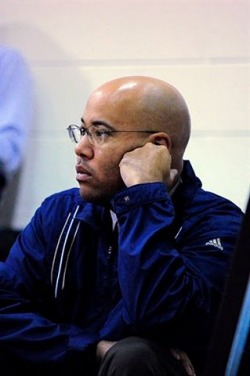
And now, the end is near, And so I face the final curtain. My friends, I’ll say it clear; I’ll state my case of which I’m certain. I’ve lived a life that’s full – I’ve travelled each and every highway. And more, much more than this, I did it my way.
Regrets? I’ve had a few, But then again, too few to mention. I did what I had to do
And saw it through without exemption. I planned each charted course – Each careful step along the byway, And more, much more than this, I did it my way.Yes, there were times, I’m sure you knew, When I bit off more than I could chew, But through it all, when there was doubt, I ate it up and spit it out. I faced it all and I stood tall, And did it my way.
I’ve loved, I’ve laughed and cried, I’ve had my fill – my share of losing. But now, as tears subside, I find it all so amusing.
To think I did all that, And may I say, not in a shy way – Oh no. Oh no, not me. I did it my way.
For what is a man? What has he got? If not himself – Then he has naught.
To say the things he truly feels , And not the words of one who kneels. The record shows I took the blows And did it my way.Yes, it was my way.
(Song lyrics for the music on this page.)
-
“A job may pay the bills, but a calling feeds your soul. “Blessed is he who gets paid to exercise his obsession”.
-
-
SPACER
-
SPACER
-
-
Web Hosting by iPage



